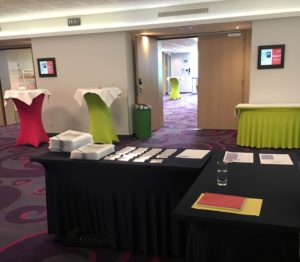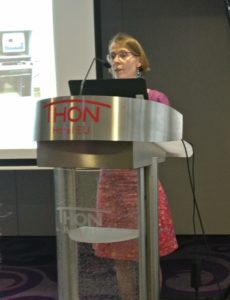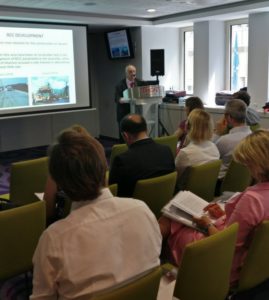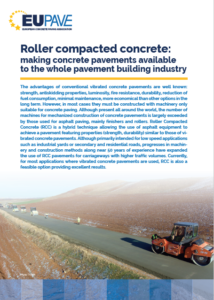On Wednesday, 14 May 2025, EUPAVE held its 10th Workshop on Best Practices in Concrete Paving at its offices in Brussels and online. This hybrid event focused on “Dowels and tie-bars in concrete pavements” and brought together around 15 participants in person and 50 online attendees.
The workshop explored both theoretical concepts and field experience related to load transfer systems in concrete pavements.
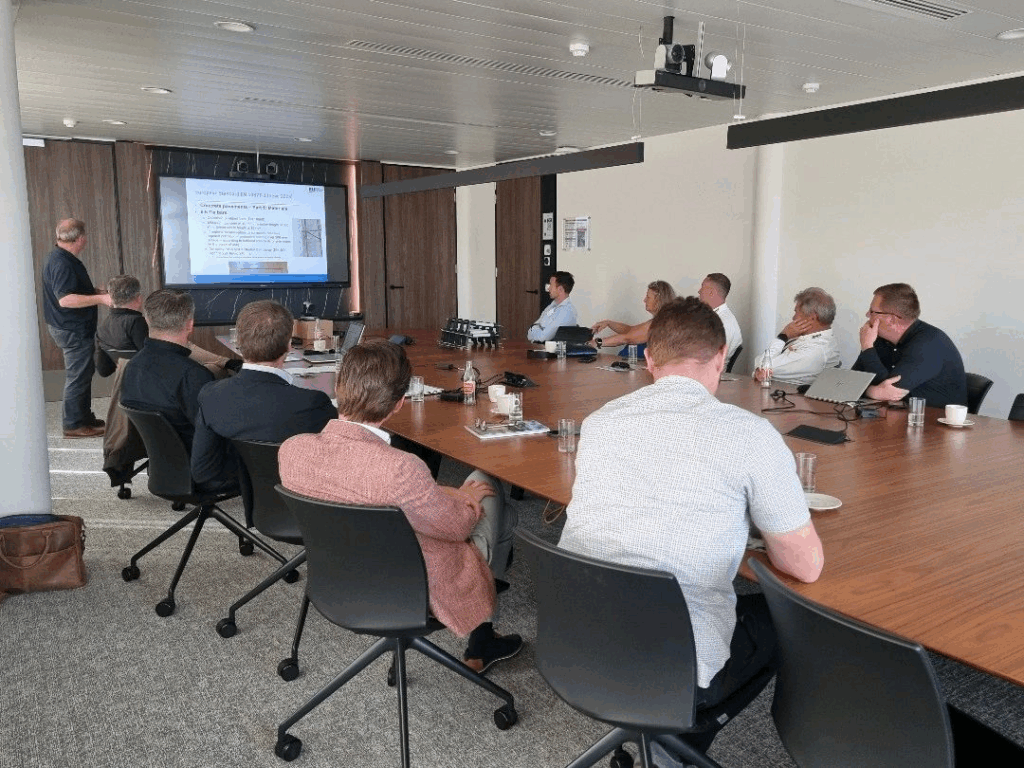
Luc Rens, Technical Director of EUPAVE, opened the event with an introduction to the topic.
The first presentation was given by Dirk Brentzel, CEO of Otto Brentzel. Dirk shared his perspective on “More than 50 years of reliable load transfer solutions in Europe,” highlighting the durability and performance of established dowel technologies.
The second presentation on “Glass fibre reinforced products, are you ready for the future?” was delivered by Tom Roos, CEO of Roos Groep. He introduced innovative materials and discussed their potential to shape the future of pavement reinforcement.
Anne Beeldens, owner of AB-Roads, followed with a talk titled “From design to practice,” bridging the gap between theoretical design principles and real-world implementation.
After a short coffee break Pascal Buys, owner of Robuco, discussed “the techniques of dowel bar retrofitting and cross stitching”. He detailed practical methods for enhancing pavement performance through post-construction interventions.
The final presentation was given by Luc Rens who presented “Standardisation of dowels – where are we now?”, offering a comprehensive overview of current developments and harmonisation efforts at European level.
The event and Q&A session was moderated by Jeroen de Vrieze from Cement&Beton Centrum, Chairman of EUPAVE’s Working Group on Best Practices.
A cocktail reception for in-person attendees concluded the workshop.
EUPAVE thanks all the speakers for their valuable contributions, as well as all participants for their interest and active engagement throughout the event.
More information on FRP dowels

Recently, the American Concrete Institute Center for NonMetallic Materials (ACI-NEx) published a new report on the use of “FRP dowels in concrete pavements” – including all aspects: materials, design, construction and performance (in the U.S.). It also includes references from Europe (Belgium) and Québec (see Appendix A). The document is available for free through the following link; you will find it in the lower right hand corner : Publications | NEx
On Wednesday, 22 May 2024, EUPAVE held its 9th workshop on Best Practices in Concrete Paving in Brussels. The theme for this year was “Non-destructive auscultation and monitoring techniques for concrete pavements.” Organized as a hybrid event, it attracted 80 online and in-person participants.
The workshop aimed to highlight advanced methods for assessing and maintaining concrete pavements without causing damage. Experts in non-destructive testing (NDT) led a series of insightful sessions, exploring the latest technologies and methodologies that ensure the structural integrity and longevity of concrete surfaces.
Luc Rens, Director of EUPAVE, started the event by presenting EUPAVE’s new Strategic Plan, set to be released in September 2024. He then showcased some innovations in concrete paving and provided a quick recap of previous Best Practices workshops held by EUPAVE.
Jeroen de Vrieze from Cement&BetonCentrum moderated the event and introduced the speakers.
The first talk was given by Dipl.-Ing. Stefan Höller from the Federal Highway Research Institute (BASt), who discussed “Falling weight deflectometer on concrete pavements – current situation and perspective.”
Luc Rens followed with insights on “Smart roads through the use of sensors”.
Mr. Kurt Pappaert, Operational Manager Inspection Drones from Citymesh, shared his expertise on “Enhancing infrastructure monitoring with non-destructive aerial techniques”.
After the break, Mr. Dirk Anke, Senior Software Developer at MIT Mess- und Prüftechnik GmbH, introduced “Dowel detection and thickness measurement“.
The workshop concluded with a recorded session by Ms. Audrey Van der Wielen, Researcher at the Belgian Road Research Centre, on “Ground penetrating radar and ultrasonic tomography”.
The presentations were followed by a Q&A session with both live and online participants. For those attending in person, the afternoon ended with a pleasant networking cocktail.
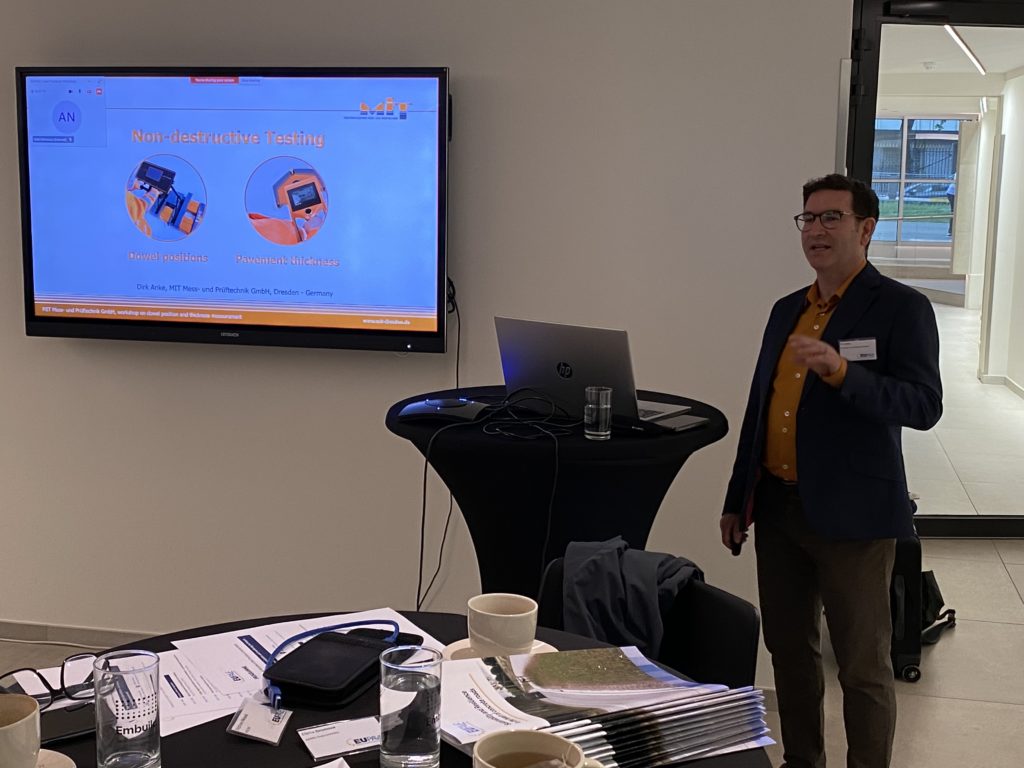
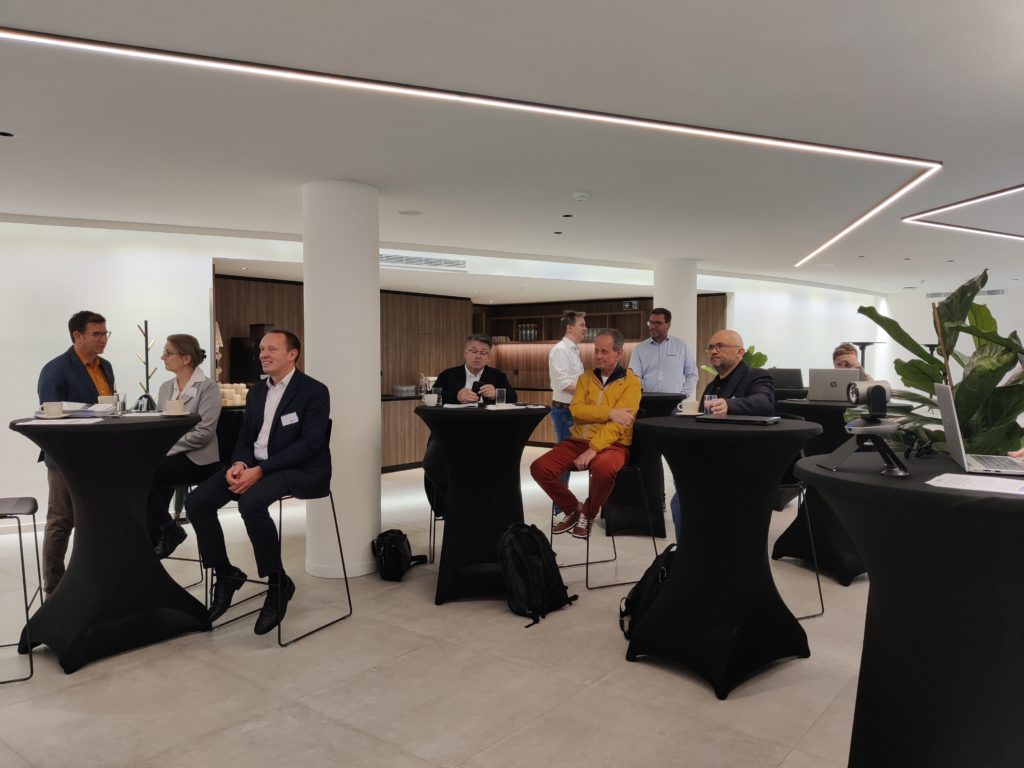
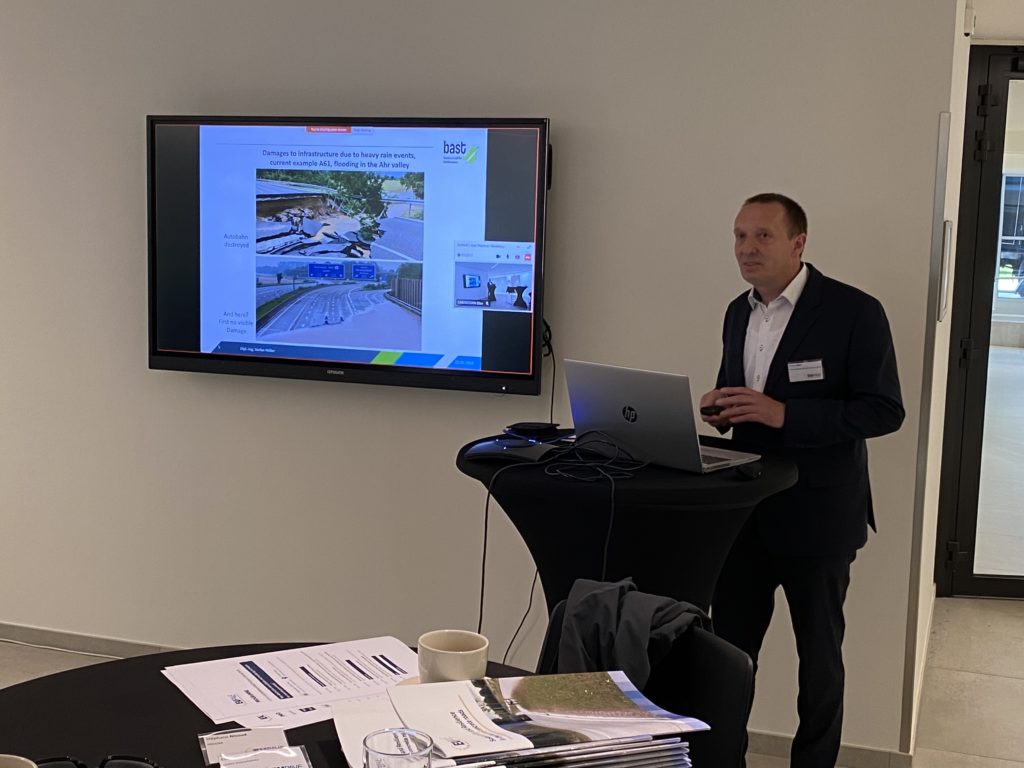
Everyone today is aware of the global challenges facing our society. The concept of “sustainable construction” has been at the heart of the construction world for many years, focusing on the three well-known pillars: economy, environment and society. With the issue of global warming, the debate is now more focused on reducing CO2 emissions with a roadmap towards complete decarbonisation by 2050.
EUPAVE is convinced that rigid solutions – concrete pavements and hydraulically bound base layers – can contribute to a more sustainable and resilient transportation network. Therefore, EUPAVE’s Sustainability & Resilience Working Group has prepared 6 fact sheets covering the different themes. The work started with an infographic “Concrete pavements make roads more sustainable”, showing the basic messages
in the different domains. Next, the fact sheets were drafted in which each sub-aspect was discussed in more detail, each time based on the latest findings from international practice and research.
The following factsheets are available in this publication:
- Concrete roads can strongly contribute to reduction of CO₂ emissions from road transport – HIGH ALBEDO.
- Concrete roads can strongly contribute to reduction of CO₂ emissions from road transport – LESS FUEL CONSUMPTION.
- Concrete roads are made with local raw materials, offer a long service life and are 100% recyclable – 100% RECYCLING.
- Concrete roads are made with local raw materials, offer a long service life and are 100% recyclable – LONG SERVICE-LIFE – LOW LIFE-CYCLE IMPACT AND COST – LOW MAINTENANCE, LESS DISRUPTION.
- Concrete roads show better resilience to climate change and extreme meteorological events – HIGHER RESILIENCE.
- Concrete contributes to more ecological water cycle management – SUSTAINABLE WATER MANAGEMENT
The Federation of the Belgian Cement Industry, FEBELCEM, and the European Concrete Paving Association, EUPAVE organised on 7 September 2023 a joint workshop on “Innovative case-studies on concrete paving” at MATEXPO 2023, Kortrijk.
MATEXPO is a biennial international trade fair for building equipment at Kortrijk Xpo. As the third largest trade fair of its type in Europe, it has an established reputation and receives more than 40,000 visitors.
Mr. Luc Rens, Managing Director of EUPAVE opened the workshop with a short introduction.
Then, representatives of four manufacturers of concrete paving machines – POWER CURBERS, GOMACO, WIRTGEN and SOMERO, all members of EUPAVE, introduced their innovations.
The first presentation was given by Juan-Luis Fumadó, International Sales at POWER CURBERS Company, LLC. Mr. Fumadó presented different case studies that POWER CURBERS have been working on. He started with a tsunami retention wall in Japan, the NASA airport at Cape Canaveral (USA), race track kerbs in France and others.
You can find his presentation here.
Mr. Patrick Zanen, Global Director of Business Development at GOMACO introduced the multifunctional concrete finishers, allowing the construction of roads and channels in high slopes. He also showed some new developments, amongst which an electrically driven slipform paver for kerbs.
Mr. Martin Datzert, Product Manager at WIRTGEN GROUP, described the innovative developments by Wirtgen in slipform paving, e.g. the new concrete spreading machines preceding the slipform paver and the advanced steering and control tools for machine operators. Emphasis was placed on the many training and assistance options that are offered.
Mr. Glenn Stobart, Territory Manager at SOMERO Enterprises, Ltd gave a presentation of “3D Concrete Paving for Commercial and Industrial Areas: the Future is Now”. He started his presentation exposing the advantages of concrete pavements such as its strength, life cycle, durability and less maintenance. He then presented the concrete paving applications using laser screeds and explained the functioning of 3D integration. He ended his presentation showing the areas of operation where SOMERO is present: external pavements, pervious concrete, tunnel construction, etc.
You can find his presentation here.
A Q&A followed the presentations.
Participants were invited by Patric Zanen to the exhibition stand of DE BRUYCKER-KEMP to take a look at the GOMACO battery-powered slipform paver.
We wish to thank the 50+ participants for their interest as well as the speakers for their great contribution and also the MATEXPO team for the opportunity of organising this event and their great support.
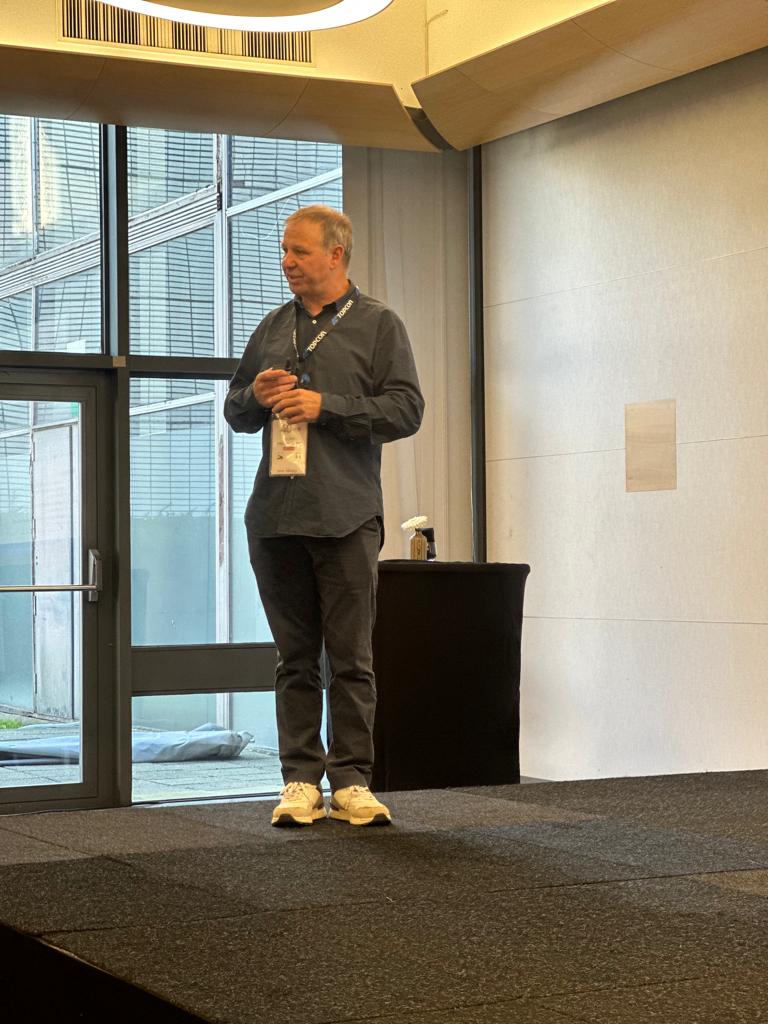
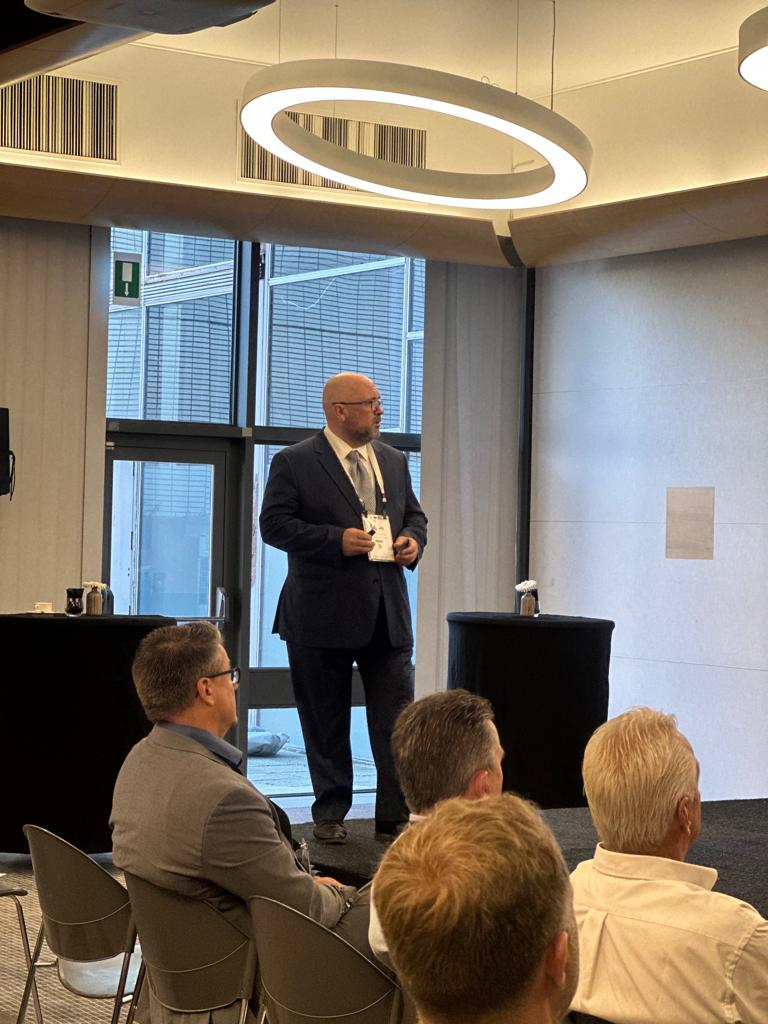
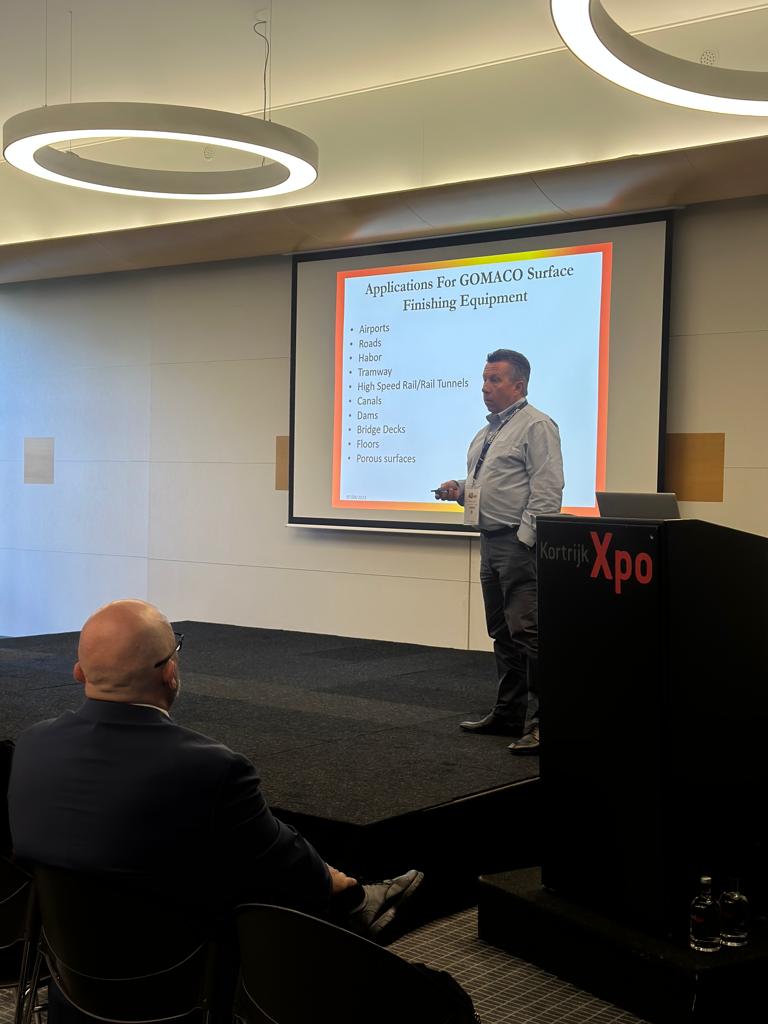
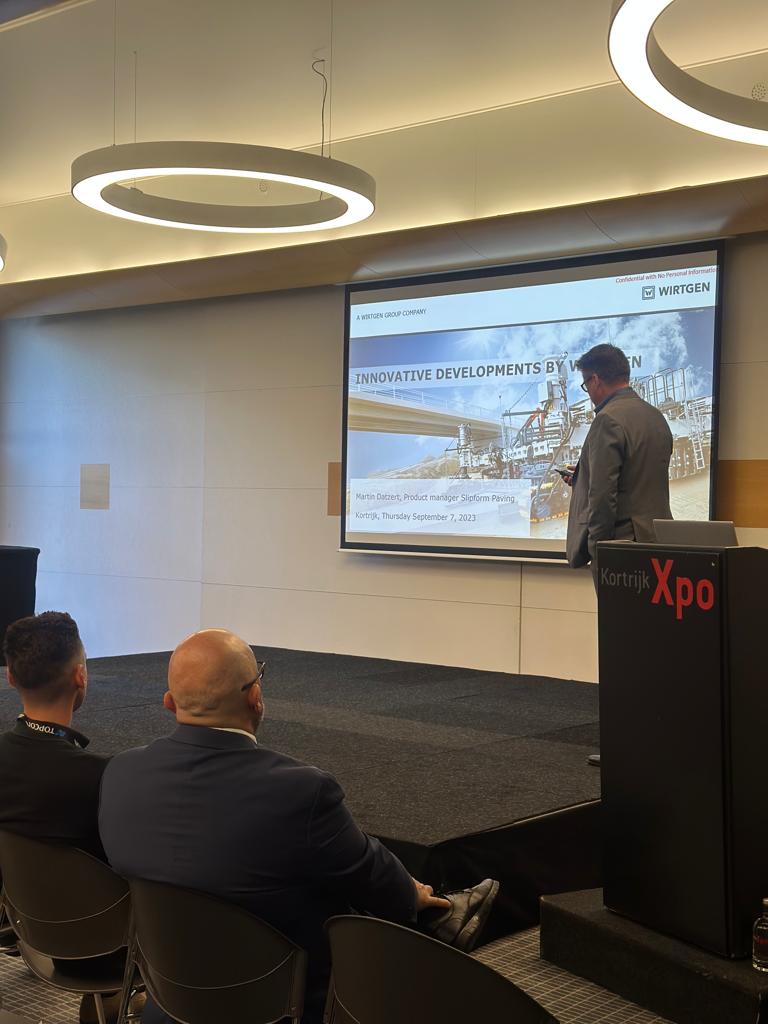
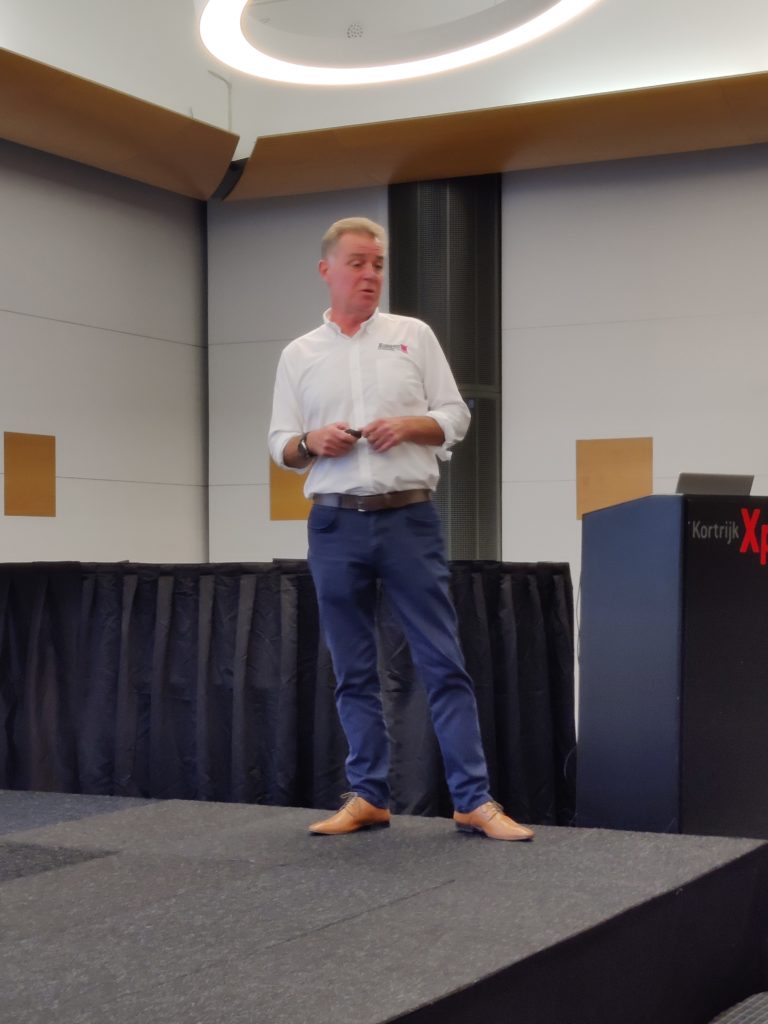
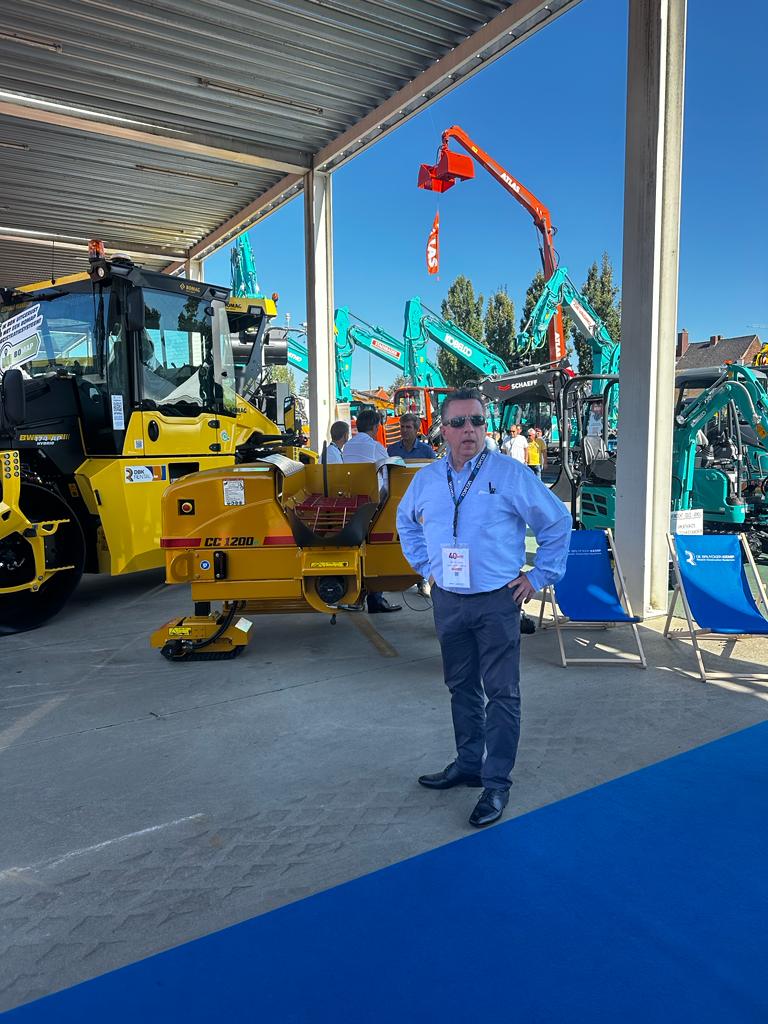
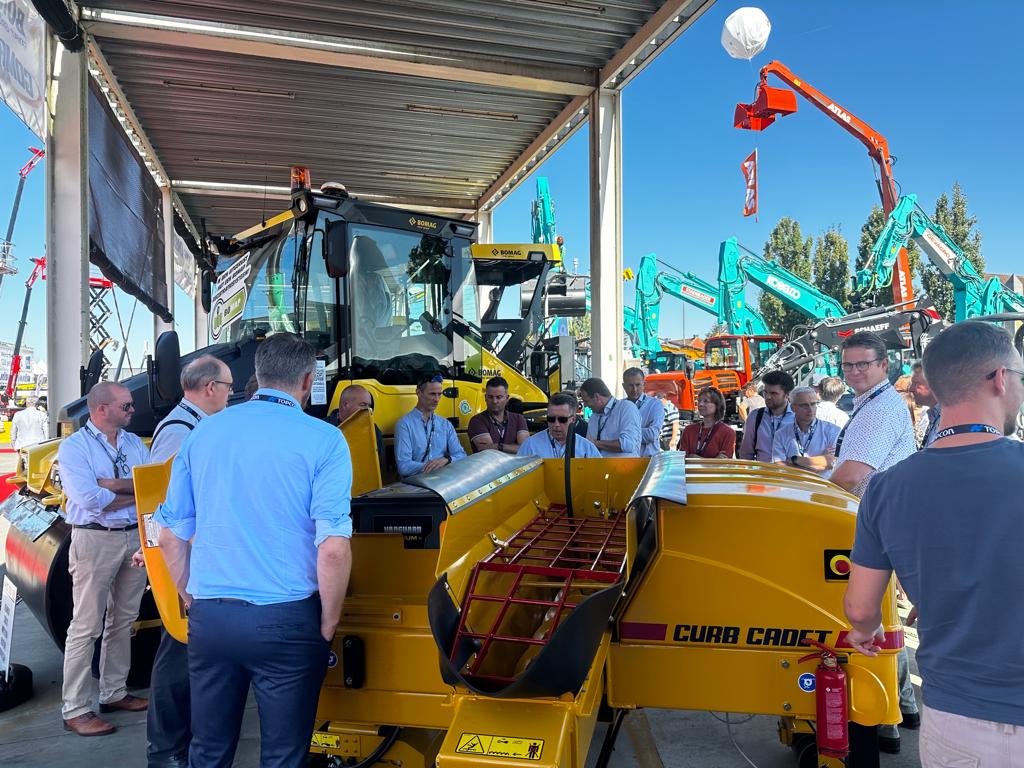
EUPAVE, the European Concrete Paving Association & FEBELCEM, the Federation of the Belgian Cement Industry have the pleasure of inviting you to their joint workshop during MATEXPO2023, with theme “Innovative Case-Studies on Concrete Paving”.
Thursday 7 September 2023, 09:00, in meeting room MC4 at Kortrijk Xpo.

AGENDA
9:00 Welcome coffee in the lobby of the Meeting Center at Kortrijk Xpo (visitors to the workshops are allowed to enter early as the exhibition is only open from 10 am).
9:30 Welcome and introduction
by Luc Rens, Managing Director, EUPAVE and Consulting Engineer, FEBELCEM
9:45 Experiences and challenges working inside tunnels
by Juan-Luis Fumadó. Director, International Sales, POWER CURBERS Companies, LLC
10:10 Multifunctional concrete finishers and new developments
by Patrick Zanen, Global Director of Business Development, GOMACO International Ltd
10:35 Innovative developments by Wirtgen in slipform paving
by Martin Datzert, Product Manager, WIRTGEN
10:50 3D Concrete Paving for Commercial and Industrial Areas: the Future is Now
by Chris Dobbie, Vice-President of Sales Europe & Middle East, SOMERO Enterprises, Ltd
11:15 Closing remarks
11:30 Visit to the outdoor exhibition
12:30 Start of “Day of the Road Construction” with speeches, followed by cocktails and a walking lunch, offered by MATEXPO
The workshop will not be broadcasted online.
For more information, please contact Ms. Elise Carabédian, e.carabedian@eupave.eu
On Wednesday 19th April 2023, EUPAVE held in Brussels its 8th workshop on Best Practices in Concrete Paving. The theme for this year was “Outdoor industrial and heavy-duty concrete pavements”. It was organised as a hybrid event, using a professional sound and video-system from the Dutch “Betonhuis” (“Concrete House”). The event was attend by around 60 participants online and in Brussels.
Concrete is extensively used for the construction of internal floors of factories and warehouses as well as for external pavements such as parking, delivery and storage areas and hard standings for heavy use in port and airport areas. When designed and constructed properly, concrete floors and external pavements will provide excellent serviceability over a long period.
Mr. Luc Rens, Managing-Director of EUPAVE, opened the workshop and welcomed the participants. He introduced EUPAVE, its mission and gave an overview of the previous workshops on Best Practices.
He then presented the design and construction of industrial pavements and the comparison with road pavements.
Dr. Anne Beeldens, Consulting engineer and owner of AB-Roads, showed how to build durable heavy-duty pavements.
The third presentation was an “Analysis of critical load arrangements for stacked containers for the design of roller compacted concrete industrial pavements” by Halil Ceylan, Professor at Department of Civil, Construction, and Environmental Engineering at the Iowa State University.
After the coffee break, Myron Hillock, Sales Director at Somero Enterprises, Inc. introduced “Levelling and compaction equipment for industrial floors and pavements”.
Jeroen de Vrieze, Technical Marketing & Statistics at Betonhuis, presented a case study “The Container Exchange Route in Rotterdam: why concrete was chosen”.
Presentation (not yet available)
The presentations were followed by a Q&A from both the live audience and the on-line participants. For the in-person participants, the afternoon ended with a pleasant networking cocktail.
The recording is available on our YouTube channel: https://youtu.be/8QA7vqWE1JY?si=Ot5ocnYPmt7xk1gp
We would like to thank:
- All speakers for their efforts in preparing the presentations and the willingness to share their knowledge and experience
- All participants, live or online, for showing your interest in EUPAVE and the concrete pavement technology
- All our Members & Partners for the support to our association
- And a special thanks to our colleague Jeroen de Vrieze and the Dutch Betonhuis for the use of the audio-visual system.
Wednesday 19 April 2023 from 13.00 till 17.00
EUPAVE Offices (Boulevard du Souverain 68 – 1170 Brussels) and online
Concrete is extensively used for the construction of internal floors of factories and warehouses as well as for external pavements such as parking, delivery and storage areas and hardstandings for heavy use in port and airport areas. When designed and constructed properly, concrete floors and external pavements will provide excellent serviceability over a long period.
This workshop will focus on different technical aspects of outdoor industrial and heavy duty concrete pavements: design, construction, concrete mix characteristics, equipment, etc. but it will also highlight why concrete pavements are often the best choice.
Free participation for all
PROGRAMME
13.00 – 13.45
Welcome coffee and registration
13.45 – 13.55
Word of welcome and introduction to the workshop
Luc Rens, Managing Director, EUPAVE
13.55 – 14.25
Design and construction of industrial pavements – the comparison with road pavements
Luc Rens, Managing Director, EUPAVE
14.25 – 14.55
How to buil durable heavy-duty pavements?
Dr. Anne Beeldens, Consulting engineer and owner of AB-Roads
14.55 – 15.25
Analysis of critical load arrangements for stacked containers for the design of roller compacted concrete industrial pavements
Halil Ceylan, Professor, Department of Civil, Construction, and Environmental Engineering, Iowa State University
15.25 – 15.45
Coffee break
15.45 – 16.15
Levelling and compaction equipment for industrial floors and pavements
Myron Hillock, Sales Director, Somero Enterprises, Inc.
16.15 – 16.45
The Container Exchange Route in Rotterdam: why concrete was chosen
Jeroen de Vrieze, Technical Marketing & Statistics, Betonhuis
16.45 – 17.00
Q&A
17.00
Closing reception
13/09/2021
The Federation of the Belgian Cement Industry, FEBELCEM, and the European Concrete Paving Association, EUPAVE organised on 9 September 2021 a joint workshop on “Offset concrete paving” at MATEXPO 2021, Kortrijk.
MATEXPO is a biennial international trade fair for building equipment at Kortrijk Xpo. As the third largest trade fair of its type in Europe, it has an established reputation and receives more than 40,000 visitors.
Mr. Luc Rens, Managing Director of EUPAVE opened the workshop with a short introduction.
Mr. Jeroen de Vrieze, Advisor Promotion, Market and Statistics from Betonhuis, moderated the event..
The first presentation was given by Arnaud de Cnijf, Support Specialist at TOPCON Positioning Belgium. Mr. de Cnijf started with presenting the company that designs and manufactures positioning products and solutions for the global surveying, construction, agriculture, amongst other. He gave a clear overview of different types of machine guidance systems. You can find the presentation here: “3D machine control: from theory to practice”.
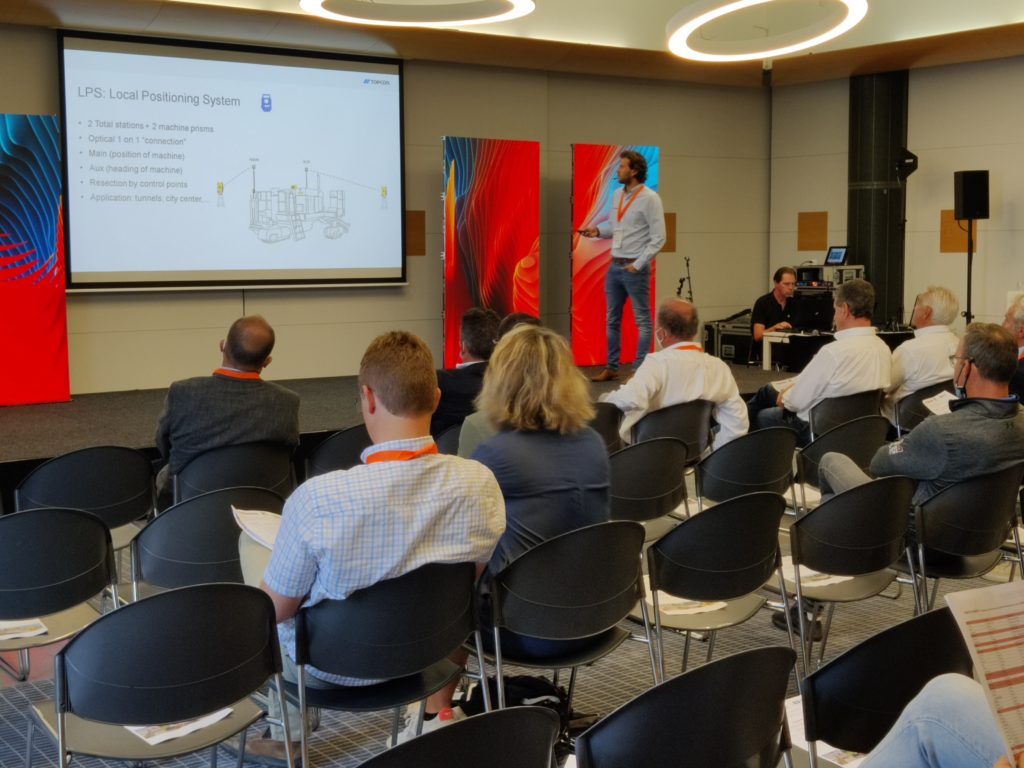
Then, representatives of three manufacturers of slipform paving machines – POWER CURBERS, GOMACO and WIRTGEN, all members of EUPAVE, introduced the offset paving applications.

Mr. Guy Tops, International Sales Manager, gave a presentation of Power Curbers starting with the history of the company. Since 1953, when Power Curbers made its first curb machine, the organisation developed its expertise worldwide. They will soon celebrate their 70th birthday.
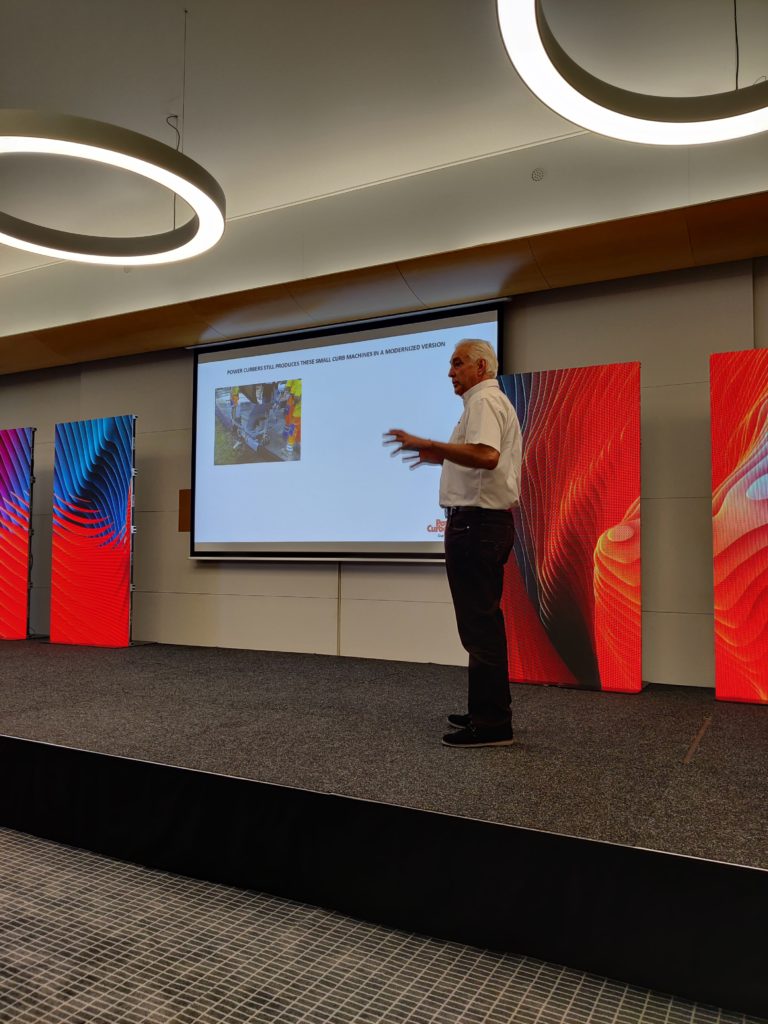
Mr. Patrick Zanen, Global Director of Business Development, showed the large spectrum of competences of Gomaco. Representatives of the Belgian contractor Superbeton explained why they chose the Gomaco 3000 and showed the benefits of the machine.
Mr. Matthias Fritz, Machine Control Product Manager, presented Wirtgen’s machines and more specifically the Wirtgen Autopilot 2.0 and its components, advantages and benefits.
A Q&A followed the presentations.
We wish to thank the 50+ participants for their interest as well as the speakers for their great contribution and also the MATEXPO team for the opportunity of organising this event and their great support.
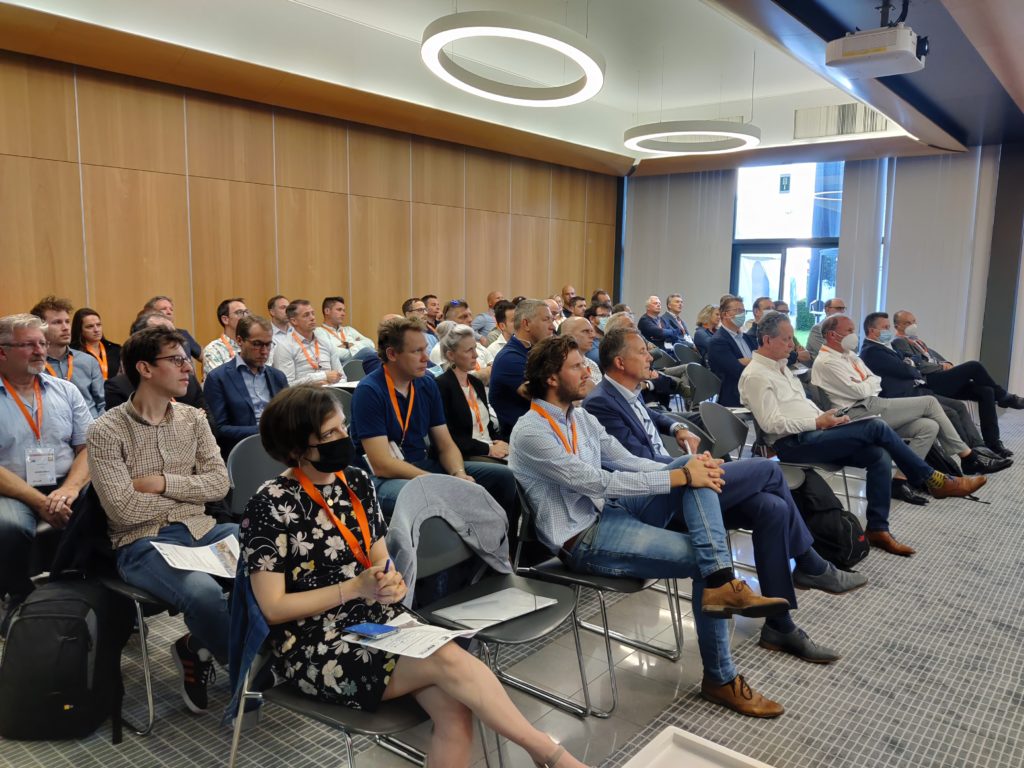
The Federation of the Belgian Cement Industry, FEBELCEM, and the European Concrete Paving Association, EUPAVE, invite you to their workshop on “Offset concrete paving”.
The event will be held Thursday 9 September 2021 from 10.00 to 11.30.
Address: Meetingcenter room MC4 Kortrijk Xpo, Doorniksesteenweg 216, 8500 Kortrijk Belgium
The workshop will not be broadcasted online.
Lectures will be given in English. Questions can be asked in English, French or Dutch.
10.00
Introduction
Luc Rens, Managing Director, EUPAVE
10.05
3D machine control: from theory to practice
Arnaud de Cnijf, Support Specialist, TOPCOP Positioning Belgium
10.25
Offset paving applications
Matthias Fritz, Machine Control Product Manager, Wirtgen Group
Frans De Jonge, International Sales Manager, Power Curbers Companies LLC
Rory Keogh, Managing Director, Gomaco International Ltd.
11.25
Questions
11.30
Walking dinner, offered by Matexpo at the occasion of the “Road Construction Day”
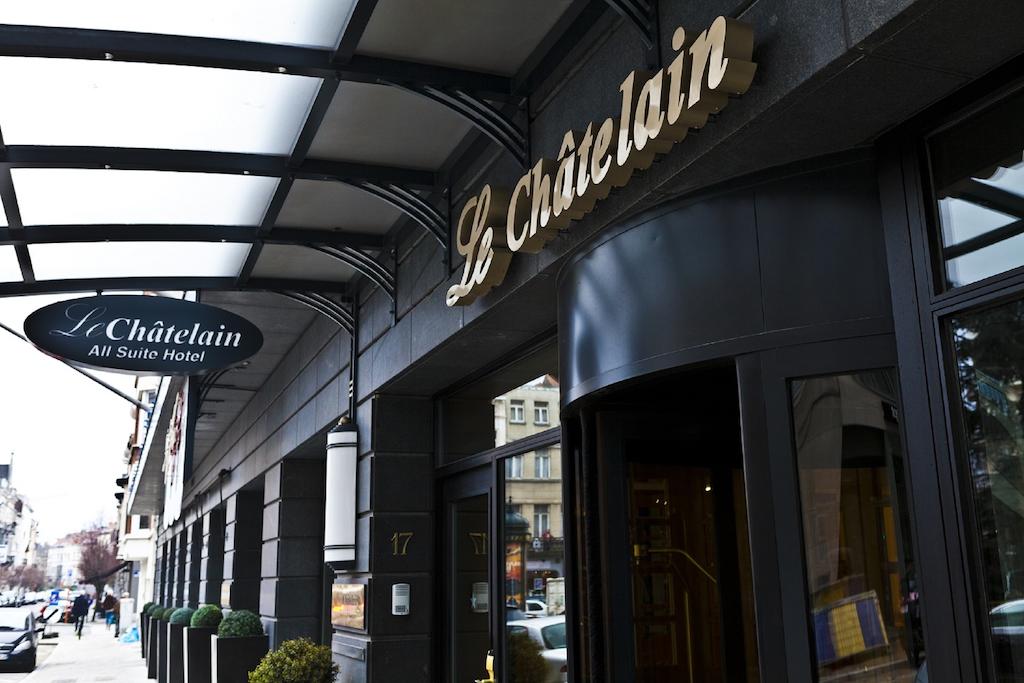
© Hôtel Le Châtelain
On Wednesday 14th October, EUPAVE held at Hôtel Le Châtelain in Brussels its 5th workshop on Best Practices in Concrete Paving. The theme for this year was “Concrete Pavement Preservation”.
Initially planned in March 2020, the workshop had to be rescheduled due to the sanitary crisis.
EUPAVE then decided to combine both a physical (limited to 10 persons) and an online event by broadcasting the event live. Attended by around 50 participants, the workshop/webinar gathered six experts in concrete paving.
Mr. Luc Rens, Managing-Director of EUPAVE, opened the workshop and welcomed the participants on behalf of Mr. Jeroen de Vrieze, chairman of EUPAVE Best Practices working group. Mr. de Vrieze could not physically attend due to the restrictive travel measures.
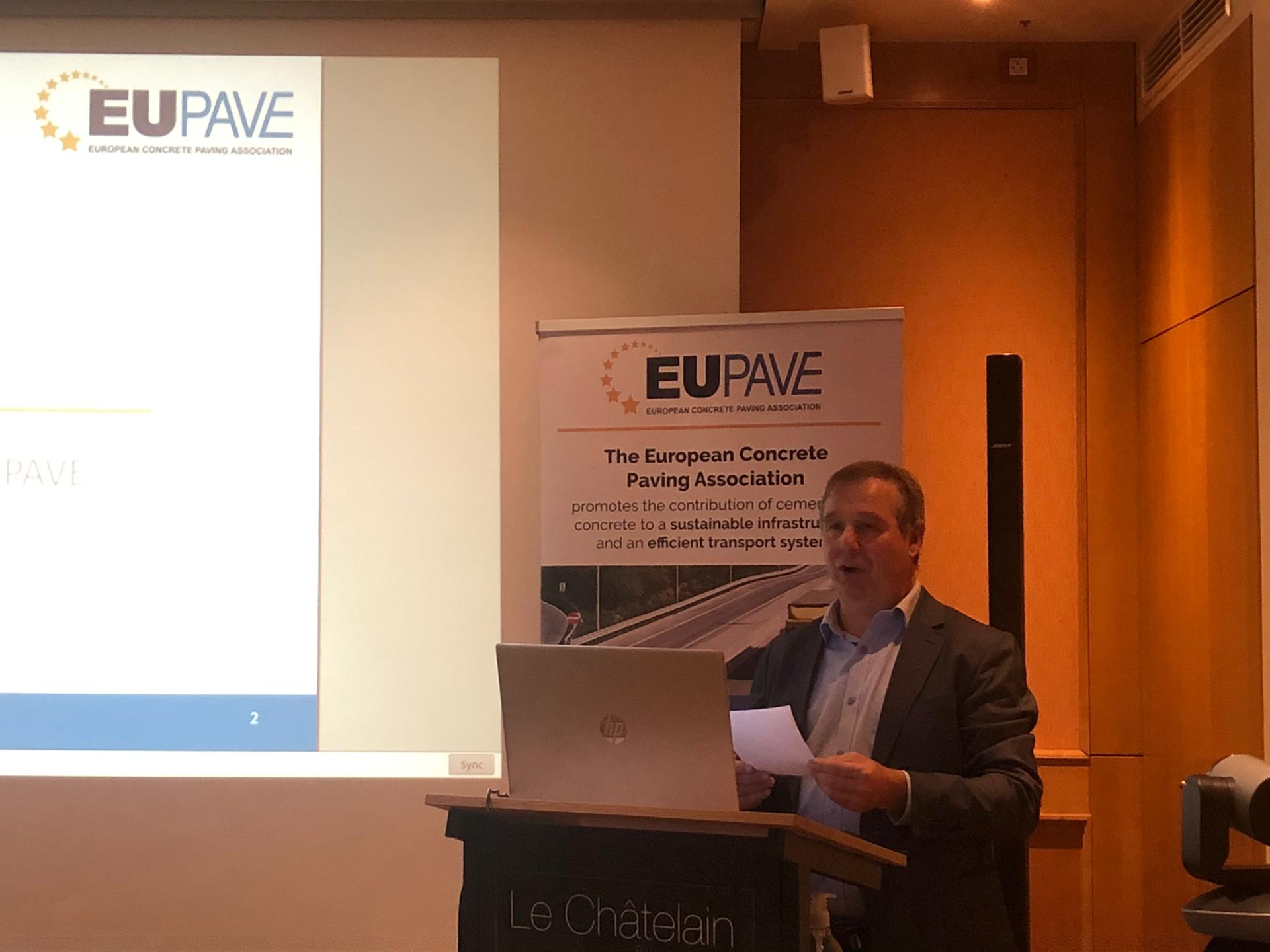
Luc Rens
Mr. Rens started the event with a presentation on the definition, concepts and strategies of concrete pavement preservation. Referring to an excellent publication on Concrete Pavement Preservation by the U.S. Federal Highway Administration, he presented a broader definition of CPP as “a strategy of extending concrete pavement service life as long as possible by arresting, greatly diminishing or avoiding the pavement deterioration process”. This strategy can be achieved by
- Designing and constructing durable long-life concrete pavements (LLCP structurally adequate and relatively distress-free throughout a long service life)
- Overlays (asphalt or concrete) as a preservation treatment
- Maintaining serviceability of the existing concrete pavement using CPR (restoration) treatments
He briefly spoke about some surface restoration techniques as a possible CPR treatment: diamond grinding, the Next Generation Concrete Surface, fine-milling and micro-milling.
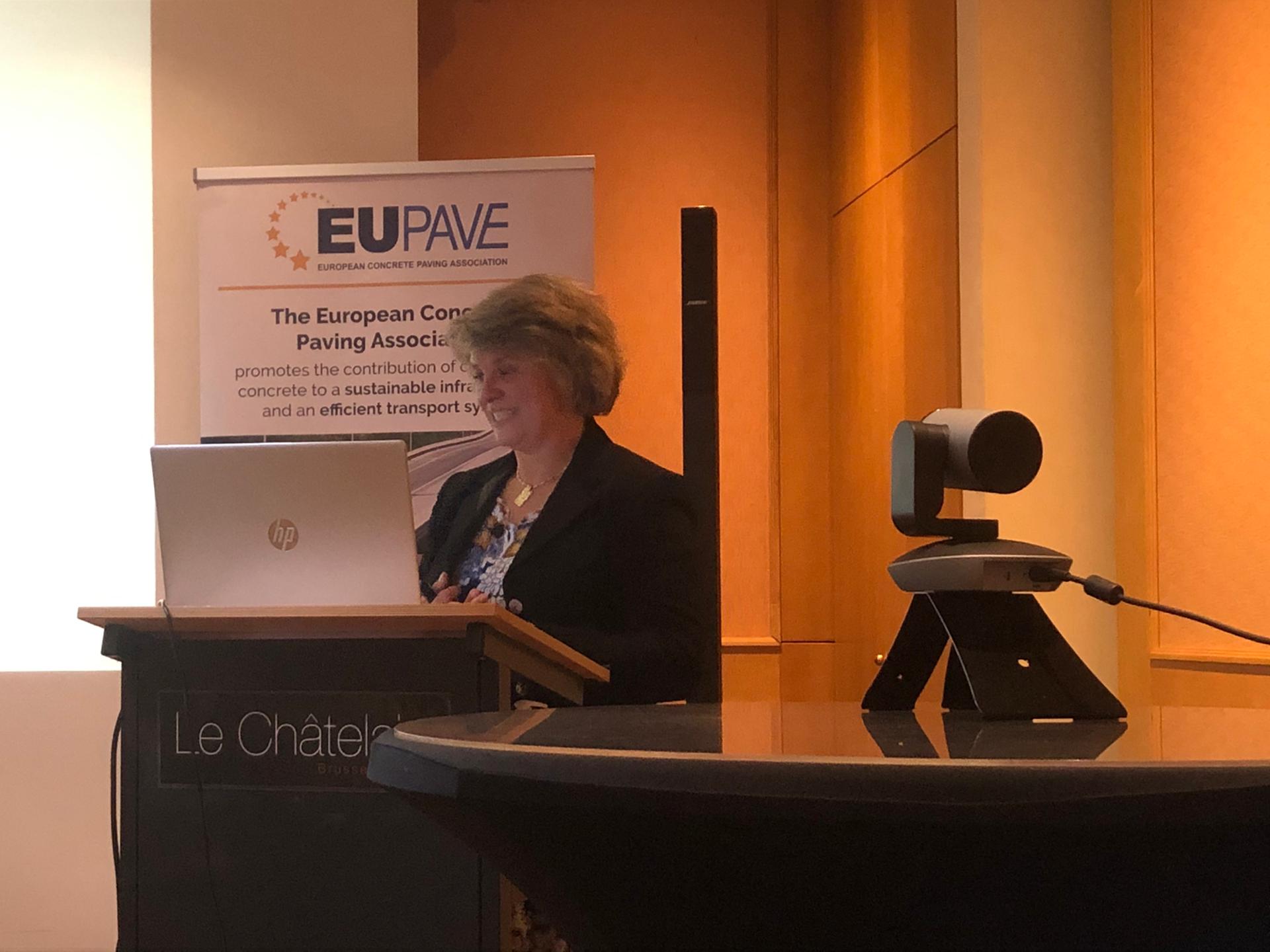
Anne Beeldens
Mrs. Anne Beeldens, owner and Consulting Engineer at AB-Roads gave a presentation on “Road Auscultation and Condition Assessment”. The well-illustrated presentation, including several practical cases, dealt with the following three domains:
- Evaluating structural adequacy: ability to withstand repeated structural loading
- Assessing the durability of the pavement materials: ability to withstand environmental deterioration
- Assessing the functional adequacy of the pavement
- Smoothness
- Noise
- Skid resistance…
Followed two presentations on “Maintenance and Repair Techniques for Concrete Slabs” from Mr. Pascal Buys and Mr. Tim Alte-Teigeler. As Mr. Alte-Teigeler could not attend the event in person, his presentation was pre-recorded.
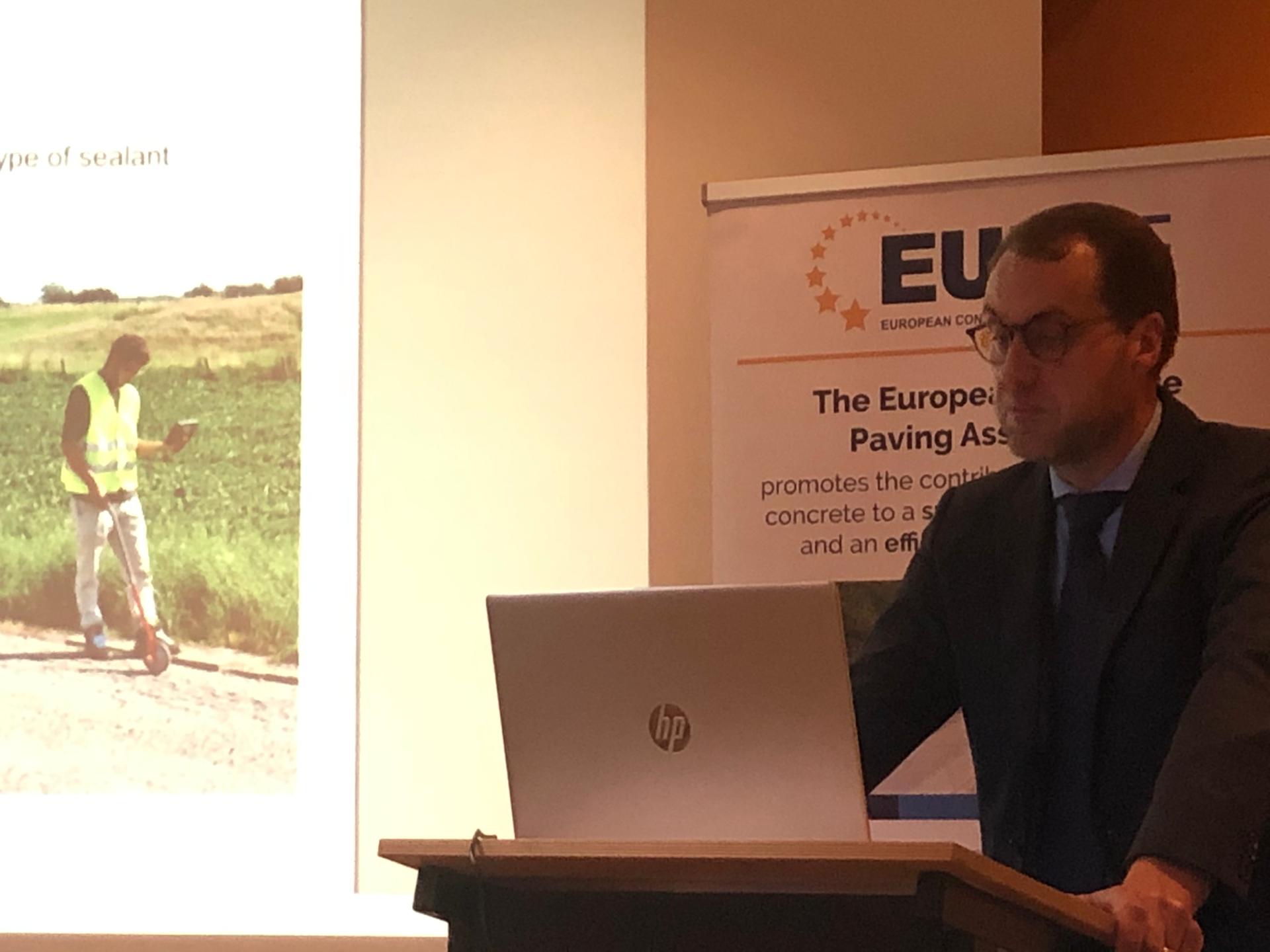
Pascal Buys
Mr. Buys, Managing-Director of Robuco, talked about the different options for joint maintenance and crack repair and presented the benefits of dowel bar retrofit, with a case study of the N44 in Belgium. Restoring the load transfer between slabs can easily extend the service life of an old concrete road (> 50 years in this case) by more than 10 years.
Mr. Tim Alte-Teigeler, Head of R&D of Otto Alte-Teigeler GmbH, focused on cross stitching, partial depth repair, lifting and stabilizing of slabs and full depth repair. He stressed the importance to choose the suitable repair technique for any pattern of damage. In order to ensure the long service life of concrete pavements, repair measures have to be applied on short notice after damages occur.
After a coffee break, Mr. Didier Snoek, Researcher at Magnel-Vandepitte Laboratory for Structural Engineering and Building Materials at Ghent University introduced the “Self-healing concrete by means of superabsorbent polymers”. His presentation included information on hydrogels, microstructure, self-sealing and seal-healing. This innovative development is obviously a promising solution for concrete pavement preservation in the future. Field tests are already going on in some projects, confirming the laboratory results.
Finally, Mr. Elia Boonen, Researcher at the Belgian Road Research Centre, talked about “Durable repair and rehabilitation of CRCP”. The principles for continuously reinforced concrete are different compared to jointed plain concrete. In the first place, the continuity of the longitudinal steel always needs to be restored in case of repairs. Different repair techniques were presented as well as some larger rehabilitation projects.
Presentations were followed by a Q&A.
Luc Rens ended the workshop with some words of conclusion.
Presentations:
1. Luc Rens – Intro & CPP – EUPAVE BP Workshop, 14102020
2. Anne Beeldens – Road auscultation and condition assessment – EUPAVE BP Workshop, 14102020
3. Pascal Buys – Maintenance repair tech concrete slabs – EUPAVE BP Workshop, 14102020
4. Tim Alte-Teigeler – Maintenance and repair techniques for concrete slabs – EUPAVE BP Workshop, 14102020
5. Didier Snoeck – Self-healing concrete – EUPAVE BP Workshop, 14102020
6. Elia Boonen – CRCP Repair – EUPAVE BP Workshop, 14102020

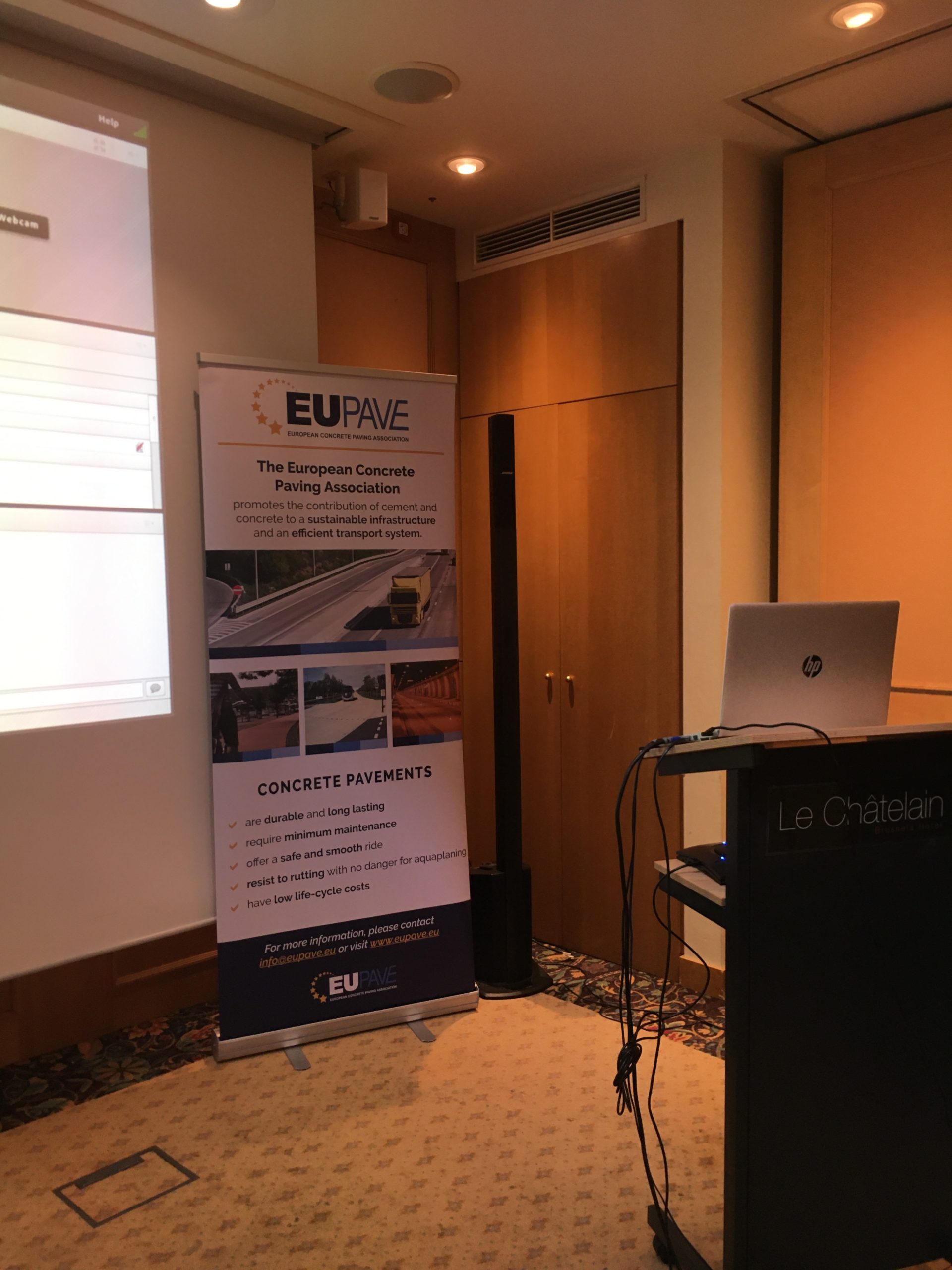
The event has now been rescheduled to Wednesday 14 October from 12.00 to 17.00
Hôtel Le Châtelain, Rue du Châtelain 17, 1040 Brussels
Following the actual sanitary crisis, EUPAVE had to slightly modify the organisation of the workshop. A limited amount of participants will be able to physically attend the event (20), while others will have the possibility to follow the presentations online. Participants will have to stay seated during the event and face coverings will be mandatory. Coffee and biscuits will be served directly to the participant’s table during the coffee break. Cocktail will be replaced by a seated-lunch ahead of the event.
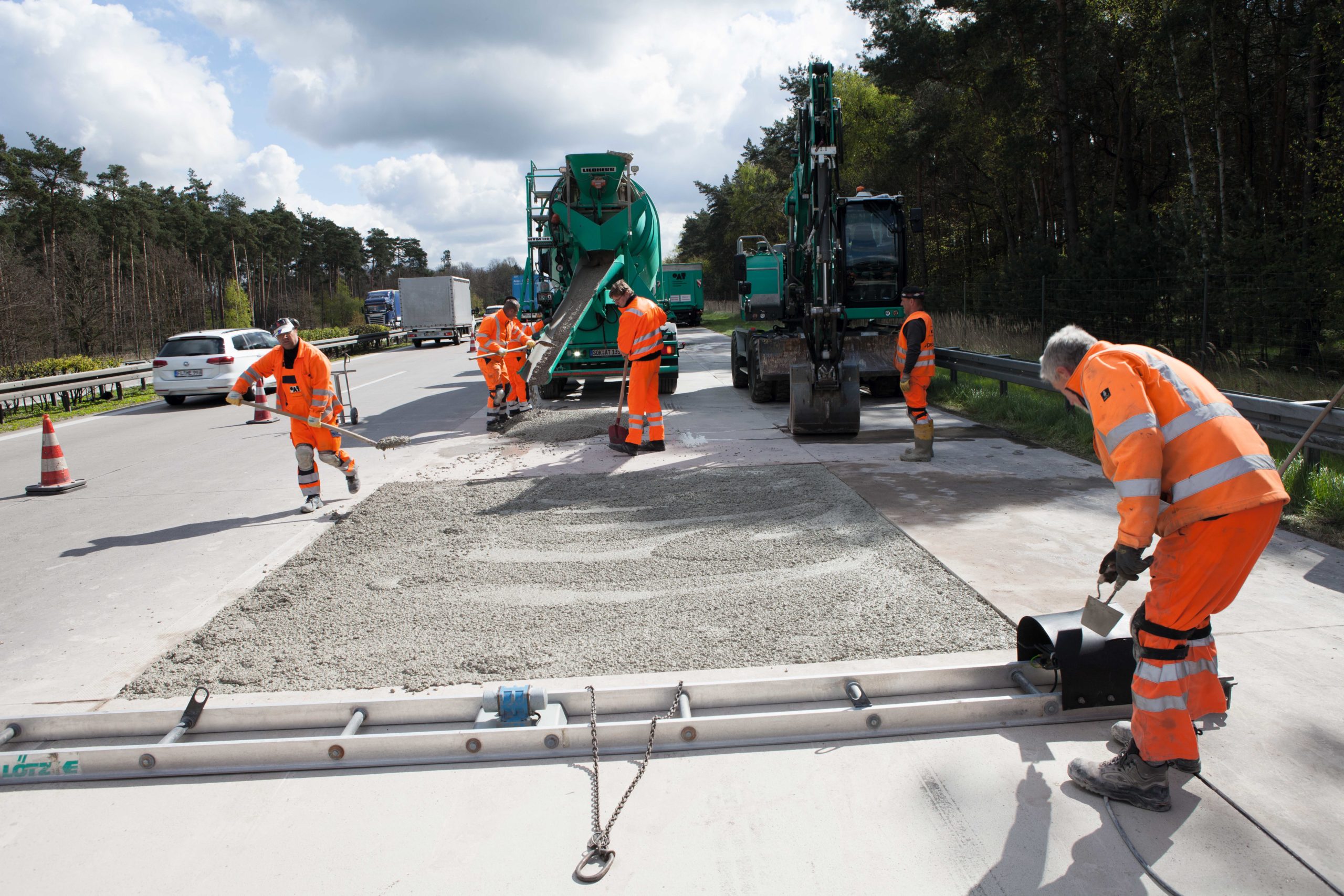
Various topics will be discussed over the day starting with Concrete Pavement Preservation Strategies and Road Condition Assessment, continuing with different Repair Techniques for concrete slabs and CRCP. Finally some innovative developments in concrete preservation will be presented: the use of self-healing concrete and multi-crystalline technologies.
This workshop is intended for experts coming from Road Agencies, Engineering Bureaus, Contractors… who have an interest in the management and preservation of concrete pavements. Participants will have the opportunity to exchange and discuss the specific aspects, challenges and difficulties experienced in that field.
Knowing seats are given in priority to the speakers, there are around 10 seats left.
Register by sending an e-mail to Elise Carabédian, e.carabedian@eupave.eu by Wednesday 7 October 2020. Please specify your participation to the lunch. Thank you
The workshop will also be available online here!
Programme
The Federation of the Belgian Cement Industry, FEBELCEM, and the European Concrete Paving Association, EUPAVE organised on 12 September 2019 a joint workshop on “Two-layer concrete pavements” at MATEXPO 2019, Kortrijk.
MATEXPO is a biennial international trade fair for building equipment at Kortrijk Xpo. As the third largest trade fair of its type in Europe, it has an established reputation and receives more than 40,000 visitors.
___________________________
Mr. Wim Kramer from Cement&Beton Centrum (Netherlands) and Chairman of EUPAVE’s Best Practices Working Group, opened the workshop and introduced EUPAVE and the speakers to the 70 participants.
The first presentation was given by Luc Rens from EUPAVE and FEBELCEM on “Two-layer concrete pavements for motorways and public spaces”. Mr. Rens gave a general introduction on what two-lift concrete pavement (2LCP) is, why using it and its benefits. He also presented 3 cases of decorative concrete pavements and gave examples of highways/motorways in two-layered JPCP and CRCP.
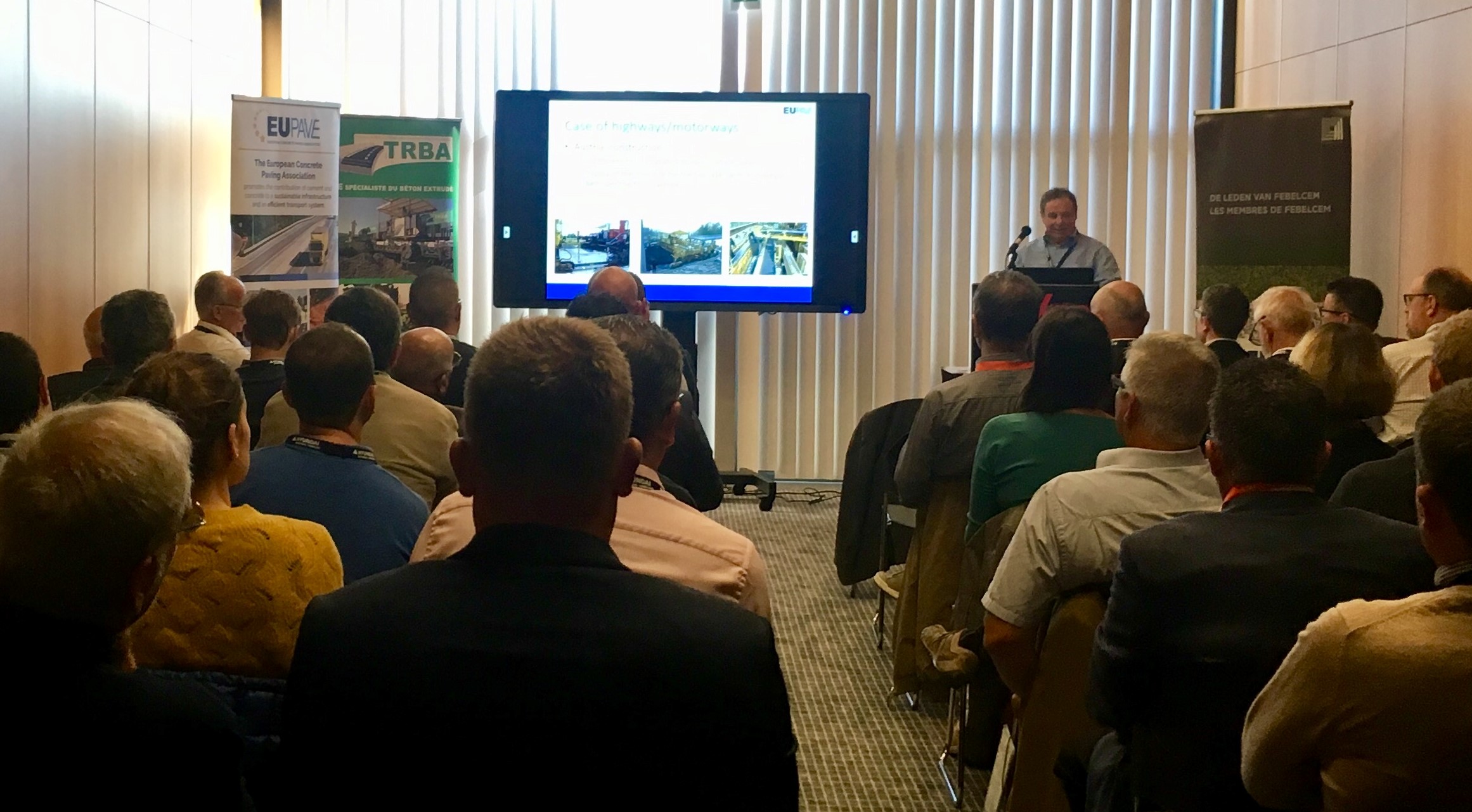
Luc Rens, EUPAVE/FEBELCEM
Mr. Martin Datzert from WIRTGEN (Germany) then introduced the “German experience on two-layer concrete for motorways”. Mr. Datzert started by explaining the different paving technologies and focused on dual layer paving with two different concrete mixes.
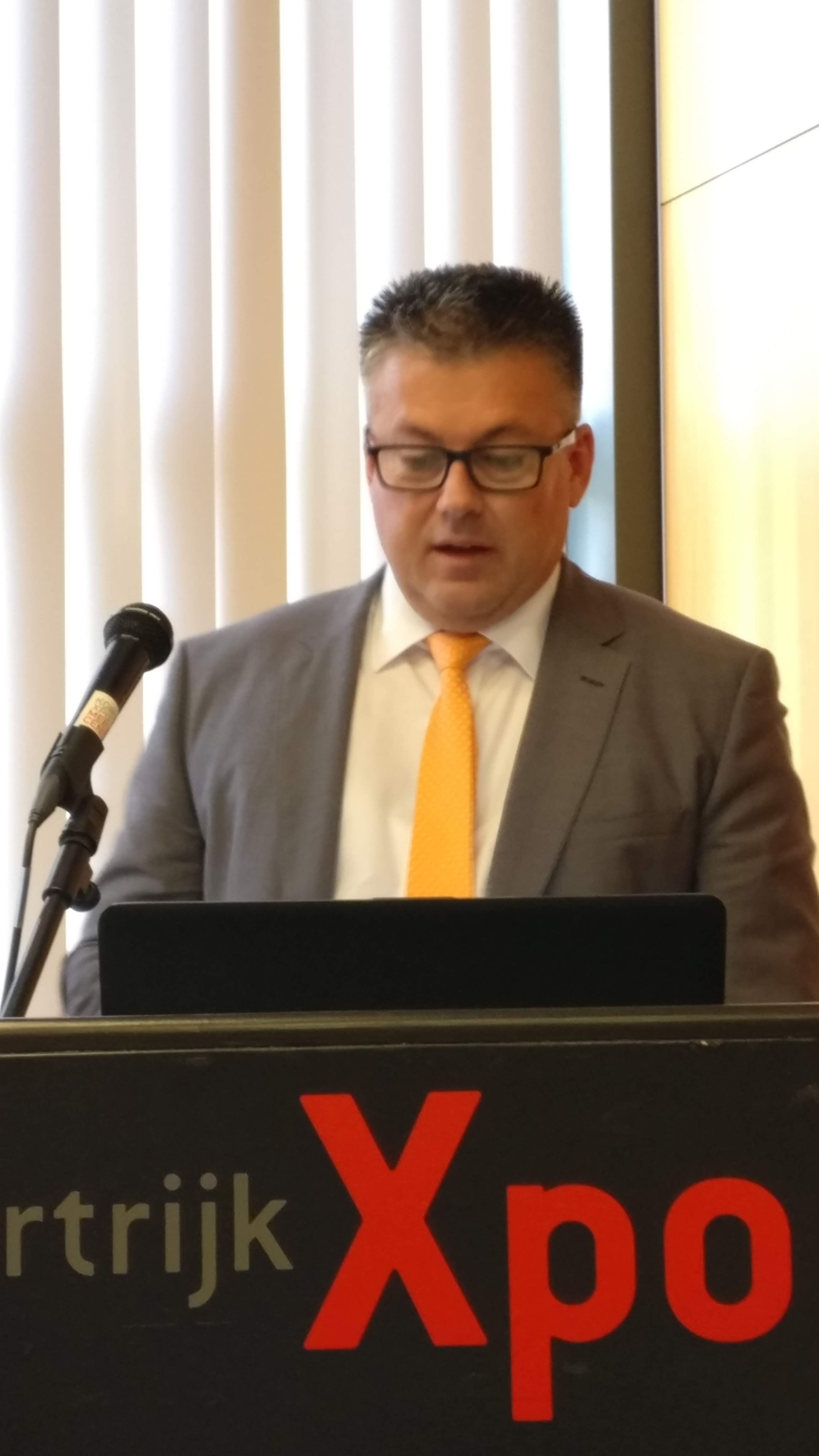
Martin Datzert, Wirtgen
Mr. Filip Covemaeker, TRBA, gave a case study of the bypass road of Couvin E420/N5. Mr. Covemaeker showed a presentation video of the company TRBA and informed the participants on the project, the equipment used and the quality and benefits of using such technique.
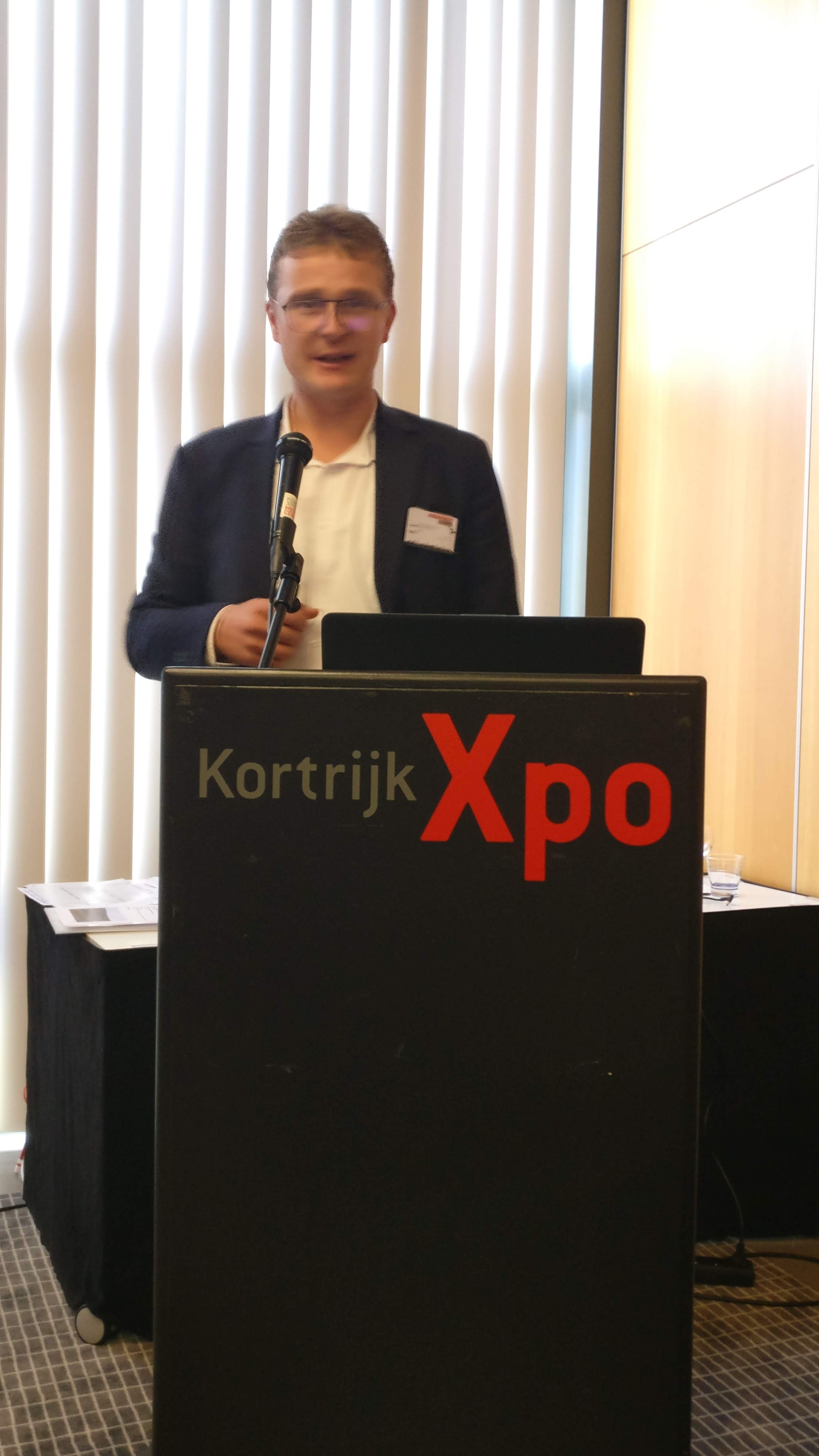
Filip Covemaeker, TRBA
Afterwards, at the outdoor exhibition, the audience visited the stands of De Bruycker-Kemp and Wirtgen where slipform pavers from Gomaco and Wirtgen were presented.
The workshop and visit ended with a walking lunch organised by MATEXPO.
We wish to thank one more time our speakers for their great contribution and the MATEXPO team for the opportunity of organising this event.
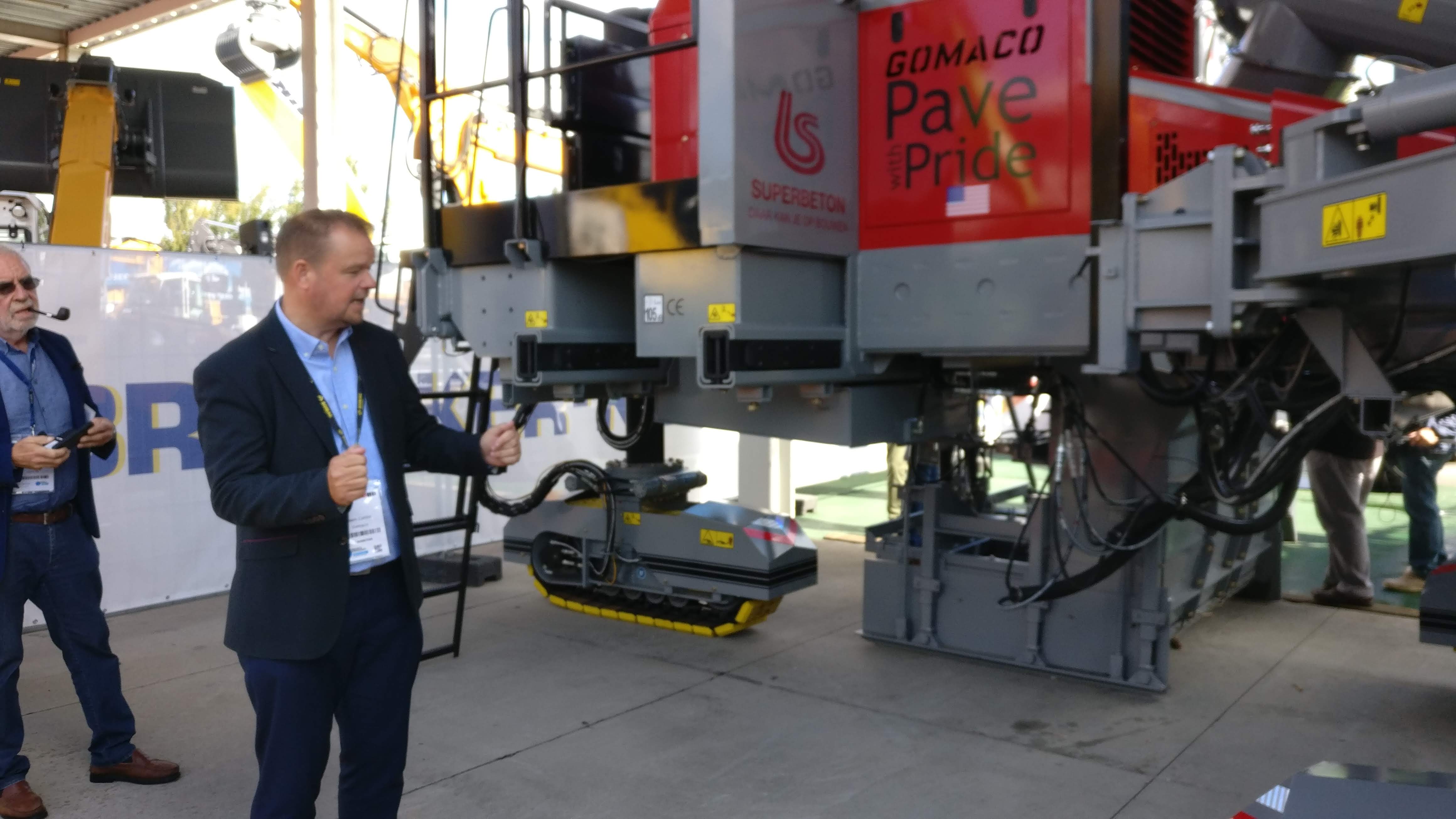
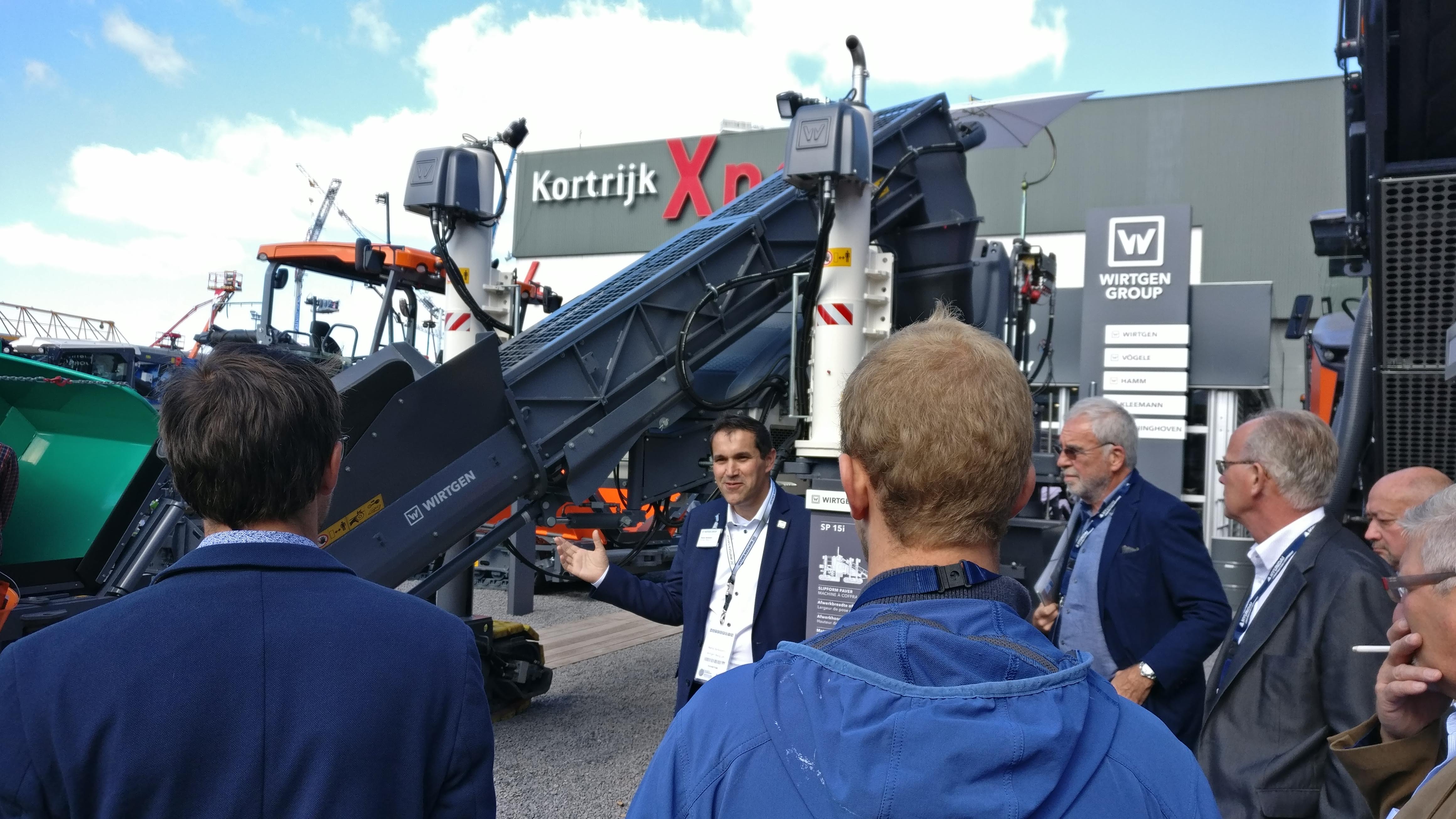
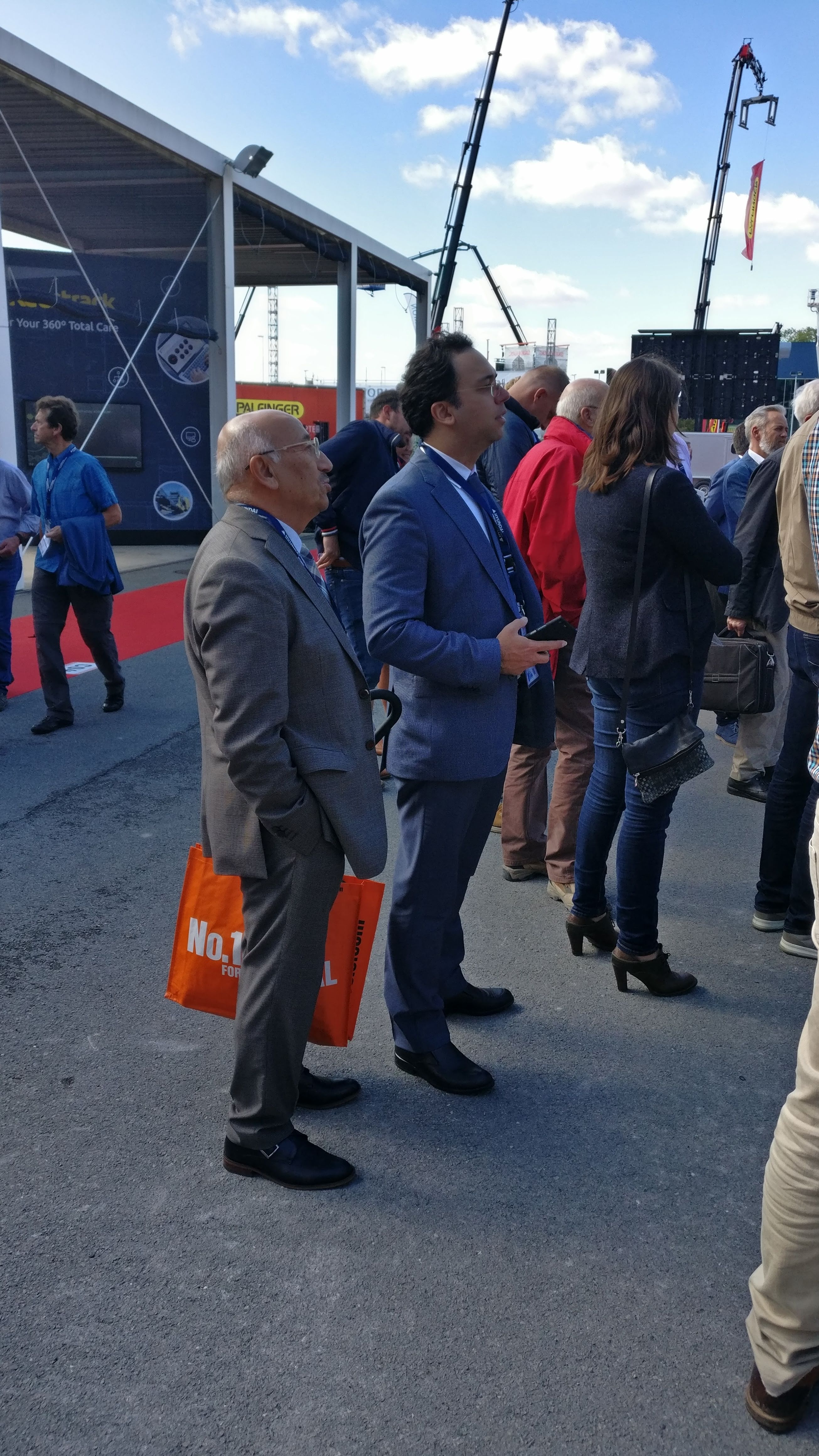
On Tuesday 18th June, EUPAVE held at the Thon Hotel EU in Brussels its 4th workshop on Best Practices in Concrete Paving. The theme for this year was “Hydraulically Bound Base Layers & Roller Compacted Concrete Pavements”. Attended by around 35 participants, the workshop gathered experts who have an interest in RCC in particular
During this event various topics were discussed over the day starting with hydraulically bound base layers, a general introduction on Roller Compacted Concrete (RCC) and the promotion of RCC across Europe. The situation of RCC in Turkey and the market of RCC in the U.S were also presented.
Each participant received a copy of EUPAVE’s new publication “Roller compacted concrete: making concrete pavements available to the whole pavement building industry”. You can find here the publication.
Mr. Stéphane Nicoud, president of EUPAVE, opened the workshop on behalf of its vice-president, Rory Keogh. He welcomed the attendees and thanked them for their presence.
Mr. Nicoud gave a special welcome to EUPAVE members and partners and introduced EUPAVE’s working groups on Best Practices, Concrete Safety Barriers, Environmental Strategy, EU Advocacy and Communication strategy. He also informed the participants about EUPAVE’s newsletter and different affiliations. He finished his introduction by an overview of the previous workshops on Best Practices organised since 2015.
Mrs. Colette Grégoire, Senior Researcher at the Belgian Road Research Center (BRRC) gave a presentation on the “standards, materials and tests methods” of Hydraulically Bound Base Layers.
Mr. Luc Rens, managing director of EUPAVE, presented the “design, construction and performances” of Hydraulically Bound Base Layers. His presentation focused on the choice of base layer, the different types of HBBL, the construction techniques and ended by final considerations such as the circular economy and climate-resilience.
Mr. Carlos Jofré, consultant, gave a general introduction on Roller Compacted Concrete Pavements. Mr. Jofré explained in which cases using RCC pavements is interesting and where to use them. He went back on the market of RCC pavements and gave some technical information.
Mr. Mathew Tranter from Cemex UK and Mr. José M. Merino, from Cemex Spain highlighted the RCC promotion across Europe.
Following the coffee break, Mr. Ozgur Yaman presented the RCC pavements in Turkey. Mr. Yaman showed the different applications in Turkey and what lessons have been learned regarding the construction of the roads.
Mrs. Anne Beeldens, consultant at AB-Roads, gave a presentation on behalf of Corey Zollinger, Director Paving Solution at Cemex and Chairman of RCC Pavement Council, on the market of RCC pavements in the U.S.
An open discussion followed the presentations.
Finally Stéphane Nicoud drew the main conclusions of the workshop:
- Hydraulically Bound Base Layers are a good solution for all types of pavements
- Several types are available depending on the design parameters,
- The preliminary design study is a good start,
- The resistance to erosion can be more important than just strength
- They fit in the framework of “circular economy” and “climate resilience”.
- RCC pavements are increasingly applied all over the world:
- Equipment are widely available,
- Properties are similar to conventional concrete,
- Mainly for low speed applications,
- Further developments in surface finishing are ongoing,
- A good way to get started with concrete pavements.
The workshop was followed by a cocktail at the hotel restaurant.
- Stéphane Nicoud, president of EUPAVE
- Colette Grégoire, BRRC
- Carlos Jofré, Consultant
- José M. Merino, Cemex
- Ozgur Yaman, TCMA
- EUPAVE new publication on Roller Compacted Concrete Pavement
INVITATION
Tuesday, 18 June 2019 from 13:30 till 18:30 Thon Hotel EU, Rue de la Loi 75, 1040 Brussels (Belgium)
EUPAVE, the European Concrete Paving Association, invites you to its 4th workshop on Best Practices in Concrete Paving entitled “Hydraulically Bound Base Layers & Roller Compacted Concrete Pavements” on Tuesday 18th, June 2019 from 13:30 to 18:30 in Brussels.
Various topics will be discussed over the day starting with hydraulically bound base layers, a general introduction on Roller Compacted Concrete (RCC) and the promotion of RCC across Europe. The situation of RCC in Turkey and the market of RCC in the U.S will also be presented.
This workshop will gather experts who have an interest in RCC in particular. Participants will have the unique opportunity to exchange and discuss the challenges and difficulties experienced in that field.
Each participant will receive a copy of EUPAVE’s new publication “Roller compacted concrete: making concrete pavements available to the whole pavement building industry”.
REGISTRATION
The event is free for EUPAVE Members and Partners. For external participants, the registration will be confirmed upon receipt of the EUR 150 (excl. VAT). An invoice will be sent to you shortly after registration.
Register by sending an e-mail to Elise Carabédian, e.carabedian@eupave.eu by Friday 7 June 2019. For non-members and non-partner, please include the name, address and VAT number of your organisation in your e-mail.
For those who decide to become a Partner of EUPAVE after the workshop, the participation fee will be deducted from the yearly partnership due of 1 000 EUR. For more information, please contact Ms. Elise Carabedian, e.carabedian@eupave.eu.
World of Concrete Europe
Workshop “Trends and developments of decorative concrete in the public space“
Thursday, 26 April 2018 from 11:30 till 12:30
Address: Parc des Expositions Paris-Nord Villepinte, 934420 Villepinte – FRANCE
Forum WOC Europe – Hall 6
EUPAVE and SPECBEA, the French Association of Road and Urban Concrete Pavements Specialists, will give presentations on the French experience in the field of decorative concrete and on the trends and developments of concrete in the public space in Belgium.
INVITATION AND AGENDA REGISTRATION
On Friday 2nd March EUPAVE held in its premises a Workshop on concrete safety barriers. Attended by around 40 participants, the workshop gathered road authorities, contractors, designers and engineers who have an interest in road safety and vehicle restraint systems in particular.
During this event various topics were discussed including the European standard EN1317, the application of CE-marking, the life cycle cost of concrete safety barriers, their durability and their construction by slipform paving.
The event also marked the launch of EUPAVE’s updated publication “Concrete Safety Barriers: A Safe and Sustainable Choice”.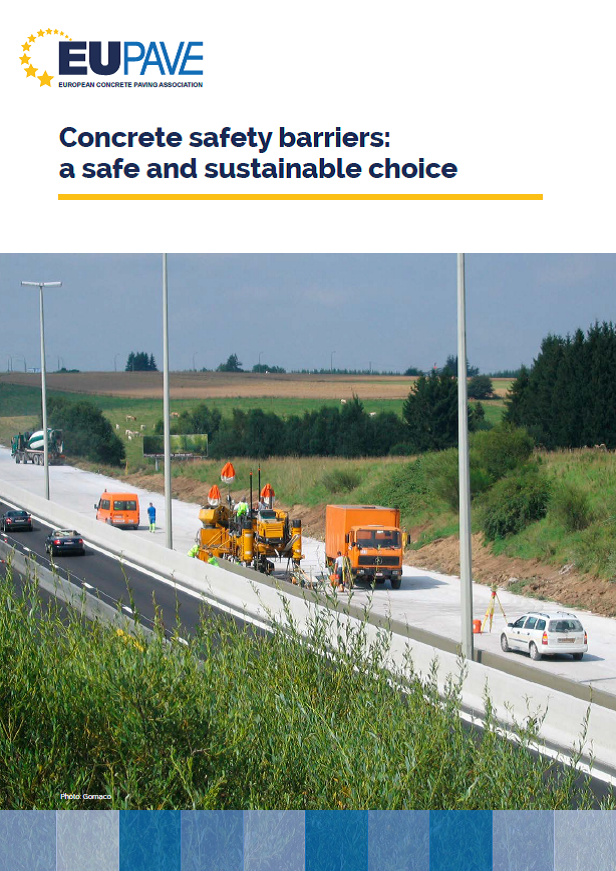
Luc Rens, Managing Director of EUPAVE, opened the workshop on behalf of its President, Stéphane Nicoud. He welcomed the attendees and thanked them for their presence. Mr. Rens highlighted the celebration last December of EUPAVE’s 10th year anniversary. He also reminded the attendance that the Association is representing and advocating the concrete pavements’ sector at European level but is also a community to exchange knowledge at technical level, thus the importance of a Working Group on Concrete Safety Barriers.
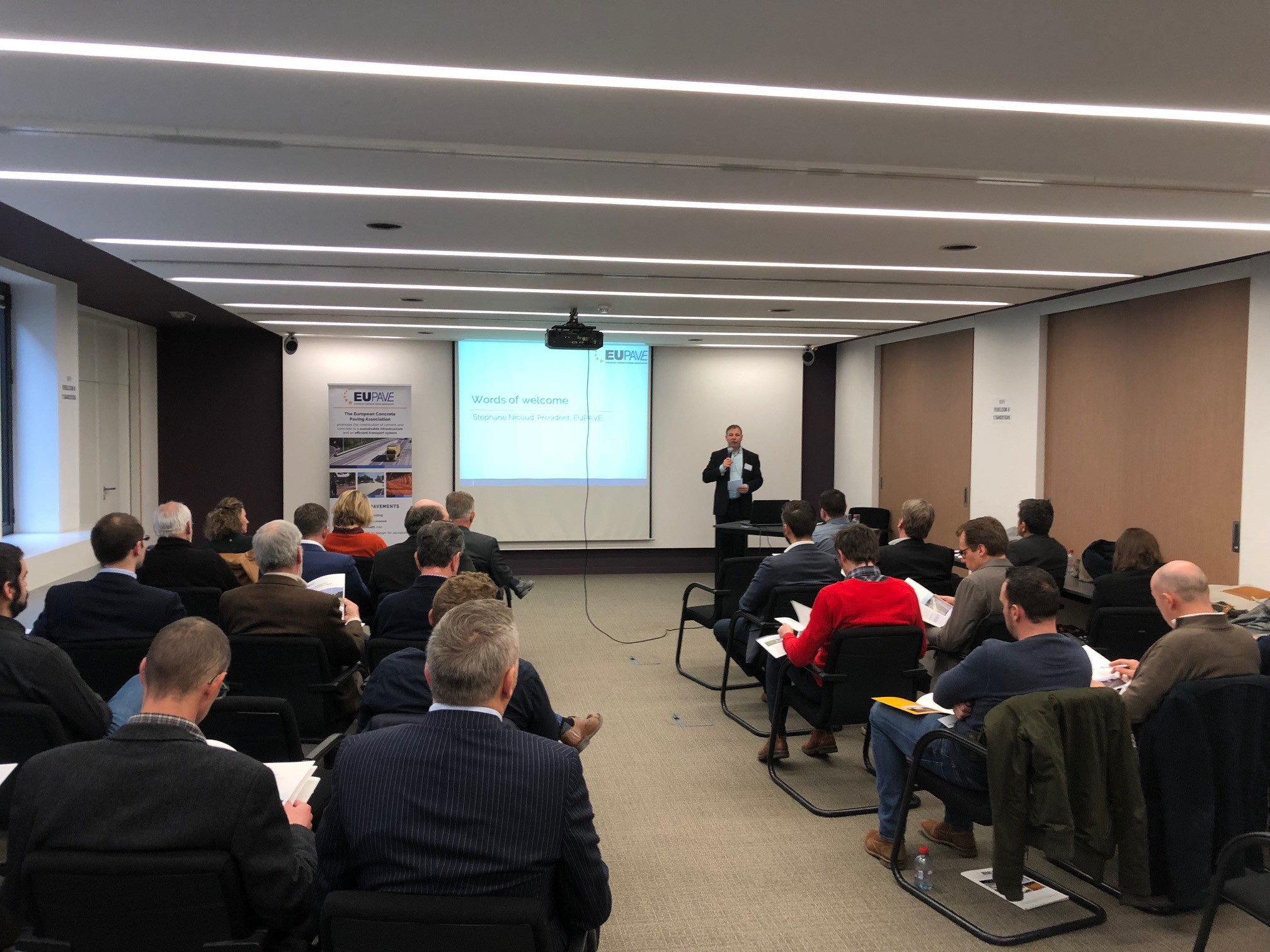
Luc Rens
Dean Courtney-Ward from BBS Barriers is the chairman of the WG which aims at developing a common position on concrete safety barriers. Mr. Courtney-Ward’s presentation focused on CE-marking. He highlighted that the European Commission has clarified that in-situ concrete safety barriers, built according to a proprietary design, have to be CE marked since they are products under CPR regulation.
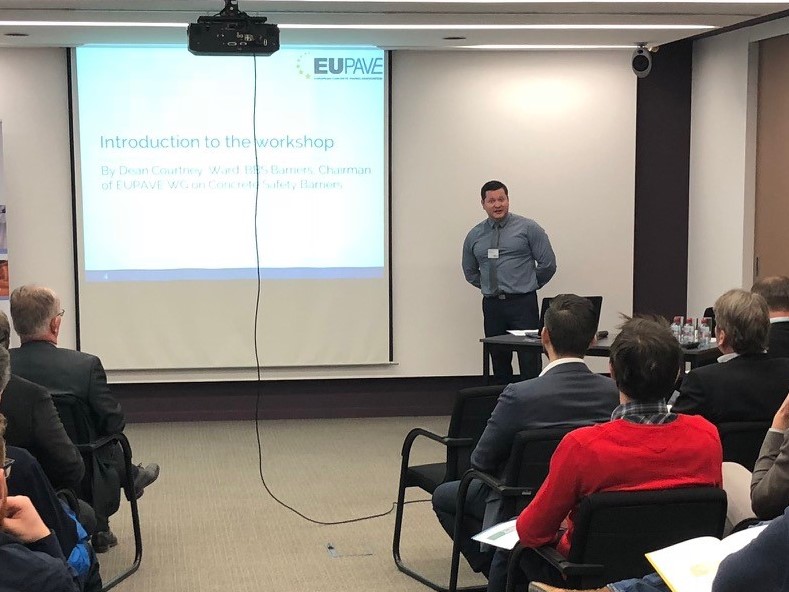
Dean Courtney-Ward
Jeanne Forêt, Chairwoman of the European Road Federation Road Restraint Systems Working Group, presented the activities of this WG such as the development of a dedicated website on road restraint systems www.rrs.erf.be, the drafting of a position paper on the role of Notified Bodies and the actions towards a better market surveillance.
As the main benefits of the standard EN1317, she mentioned:
- a unique performance-based methodology for assessing road restraint systems across Europe and
- a single market for road restraint systems within the EU thus allowing road authorities more choice and guarantee of performance.
In the field of Motorcycle Protection Systems, ERF is working together with FEMA, the Federation of European Motorcyclist Associations. Mr. Dolf Willigers, General Secretary of FEMA, was present at the workshop. He briefly presented his Federation and considered concrete safety barriers as a reasonably good solution, better than any system with unprotected steel posts.
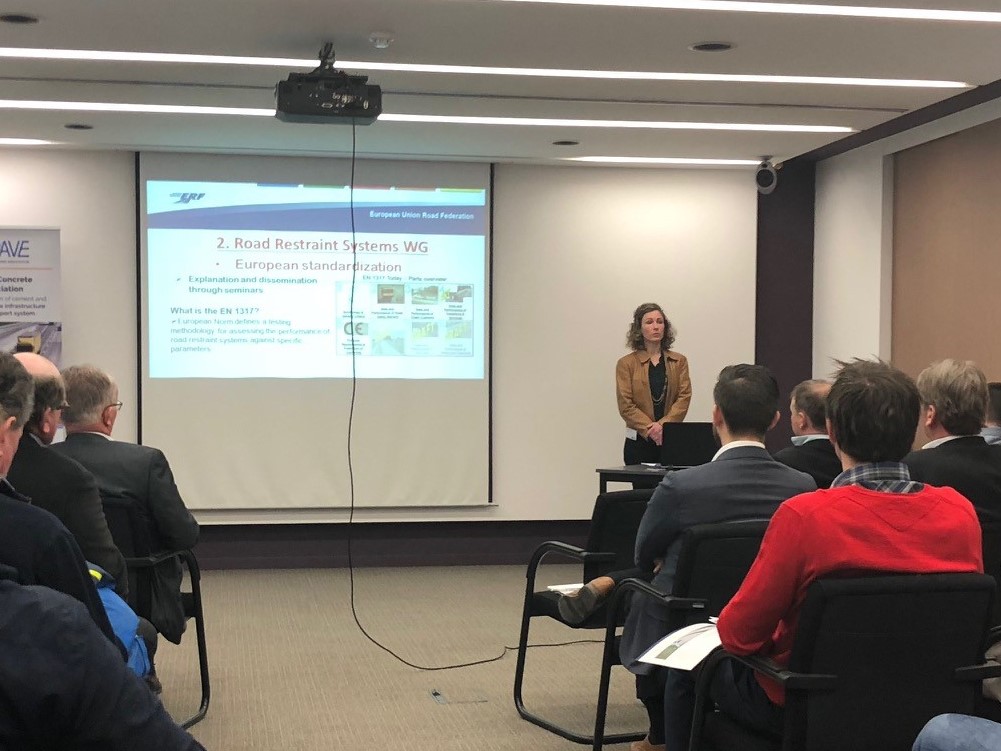
Jeanne Forêt
Martin Page, Technical Manager for Deltabloc France and Convenor of the standardization working group CEN TC226 WG1 explained how to interpret the standard EN1317, in its today’s version, with regard to in situ cast concrete safety barriers. He also mentioned the work in progress in order to further clarify the status and possible issues of in situ cast barriers in the next edition of the product standard.
Tom Ashworth from Extrudakerb, highlighted the advantages of installing concrete safety barriers by slipform paving. He specified that following completion of slipform operations, Extrudakerb undertake a final compliance check to ensure that the products placed have been installed in line with standard specification requirements. A CE Certificate is then issued to the client along with a full completion pack, containing all pertinent quality documentation.
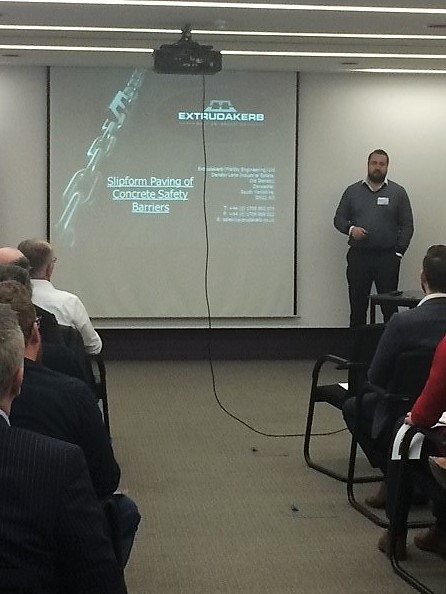
Tom Ashworth
John Richards from Gwynedd Council presented his work on the Life Cycle Cost study of Road Restraint Systems”. It appears that concrete has a significantly reduced maintenance cost over a 50 year life cycle, while also providing higher containment for a similar cost. Consequently, concrete barriers are the overall most cost effective option.
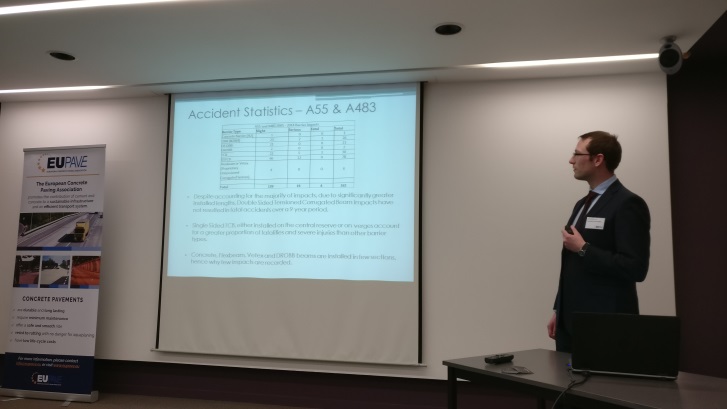
John Richards
Mr Thomas Edl from Deltabloc International focused on research and innovation in the field of concrete safety barriers. The first part of his presentation dealt with an ongoing research project looking for solutions of corrosion resistant reinforcement through artificial aging. Stainless steel or epoxy coated strands were recommended for optimal lifetime performance in severe environmental conditions. In the second part, the development of a new type of “Zero Debris Concrete” was presented. Spectacular full scale tests showed how no parts got detached from concrete barriers, both precast and slipformed, even after repeated impact. Thanks to these improved performances, concrete barriers are ready for future requirements.
Luc Rens, Managing Director of EUPAVE gave an overview of the market situation of concrete road restraint systems in Europe, varying in different countries from a few to over 60%. He also explained that the choice for concrete in the central reserve is fully justified because of the strong points: the combination of a high containment level and limited working width, the robustness of the system and its long life performance. He concluded with a positive trend in construction practices thanks to modern slipform paving machines and joint cutting equipment.
Finally, Dean Courtney-Ward drew three main conclusions out of the workshop:
- In situ concrete safety barriers from a proprietary design are products under the Construction Products Regulation;
- They are in compliance with the EN-1317 standard;
- The CE marking is applied and is valid for the life of product.


